#at a point its who has better illustrations
Explore tagged Tumblr posts
Text
OH MY GODDDD
they did it! they kissed! they’re officially dating! their marriage isnt a sham anymore
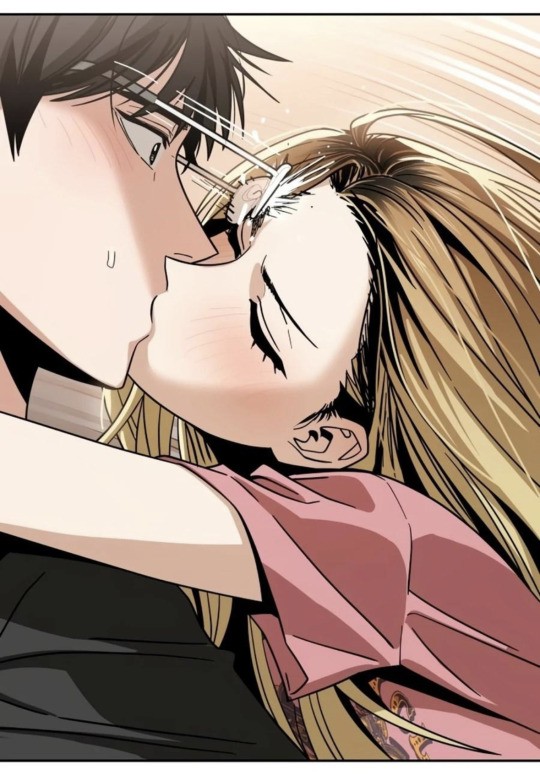
Holy shit. I swear after reading other romance manga/manhwa where it takes forever for a real move to be made like this, this is just majorly surprising omg
#desiree talks#desiree reads#also thanks to Kr for giving me relationship hope as i enter the 2nd half of my 20s#being exceptionally single#Jp does too but the whole office lady romance mangas#remind me of those trashy romance novels you find at target lmao#like after a while the whole 30 y/o virgin getting railed by her boss/the ceo gets old#at a point its who has better illustrations#some stand out more than others#and others are webtoon format that’s obviously digitally drawn but not in a good way
0 notes
Text










Finally got stuff scanned! So!!
The last of my sketches from @alicat54cwriting and @amevello-blue 's Chessboard AU (for now) mostly featuring assorted scenes from En Passant.
(with a bonus page featuring a scene from Pawn's Gambit and some from The End of Our World. Look at Vinny. He's. so big! The boyyyy! Bardi 's in his emo phase.)
As per always and forever, I highly recommend these for some good Rise aus, mind the tags, etc etc.
#illustration#rottmnt#rise of the tmnt#rottmnt fanart#this is not meant in any way-shape or form- as a pressure or critique or anything against the amazing authors. who have been very kind and#amazing since i started posting my art of their fics! but the idea of Casey Sr and Simoni interacting occurred to me while i was reading and#it has not let go. can you imagine the chaos. the property damage. the volume. dear pizza supreme. nyc would not survive.#so its probably better they didnt put that in the fic itself lol#ill probably draw grown up Momo and Zio at some point. once the.... emotional... damage ... settles a bit.
52 notes
·
View notes
Text
i got the cutscene <3
#its actually crazy that there was even more content i missed that impacted the story this much#like this rlly illustrated how even tho my character and astari0n have both become better people astari0n is still so behind in that#(we know why ofc. hes still acting like a feral cat trying to self preservere with teeth and nail and all until the very end; the ritual)#my character had his most obvious 'shifting point' at the transition from act 2 to act 3#like he fully realized that this is now truly bigger than himself. he has left marks on the lands and he has to go all the way#he has made true friends. one of his best friends is the kindest most compassionate person in the world#and very importantly he loves astari0n and THAT is the reason he now feels this actual compassion towards the other spawn#hes so personally invested in this issue now#and he can say that 'the world can be a wonderful place if you find your home in it astari0n' bc its something he has just recently had#a personal revelation abt#and astari0n deflects it and describes my character as someone who now 'spends their life sorting out other peoples problems'#and it rlly brings it to focus that he just cannot meet him where hes at anymore#just great conflict that feels actually meaningful and perfectly fits into the roleplay storyline ive made for my character#and omg the line 'im doing this for you too you know. to make sure were both safe. forever' from astari0n is just AAAAAAHDJJDJD. CRAZY#bc we know how toxic he becomes towards you if he completes the ritual!!!!!!#HHHHH this character!!!!! hes just MWAH. perfection#i cant wait until i get to doing the szarr palace again bc this added conflict will make the conclusion of this quest even more satisfying#anyway TOTAL tonal shift time. in start of the cutscene astari0n is standing next to the bed my character was sleeping in#so i can now have the hc that some nights they sleep in the same bed <3#(WELL. you know. my character sleeps while he meditates)
2 notes
·
View notes
Text
Aquamarine. Gold. Lavender.Colors of summer... Astro Observations
work by astrobydalia

Your 9th house rules your gandchildren! 9th house is 5th from 5th so your kids' kids.
Also, if you are any of your parent's first kid look at their 11th house to get a glimpse at how they will perceive your fs. (11th house is 7th from 5th, so your first kid's spouse)
^^these are derivative astrology methods so you gotta use whole sign system
The scorpion actually represents the underdeveloped/young version of Scorpio while the developed version of Scorpio is represented by the eagle which to me is analogous to the phoenix. That's why you see an eagle representing Scorpio in the The World card (cause this card signifies fulfillment or completion in tarot)
I think the song 'Part of Me' by Katy Perry really illustrates developed Scorpio energy. Is not resentful or vengeful but rather transformative and empowering, you can't end their spirit just like you can't end a phoenix. Underdeveloped Scorpio energy allows pain, trauma and resentment to ultimately k!ll their soul which turns into self-destruction, think how scorpion's stinger actually points at them (and fun fact: scorpions can actually k!ll themselves when they feel cornered)
Being "different" or an "outcast" is not an Aquarius trait, it's a Leo trait. Leo is all about being yourself, being unique, the one and only and main character energy. Aquarius rules inclusivity, equality, social cohesion, FRIENDSHIP (aka people who get you) and public validation, that's why it is a strong fame indicator. Aquarius energy is relatable to others, its new and fresh, Leo it not relatable because it is unique, it shines among the crowd and burns just like the Sun. Aquarius can be unique too but the main difference is Leos feel ultimately they only have themselves while Aquarius will always have people.
Leos are meant to experience feeling "different" or outcasted because they need to learn to accept and express themselves no matter what, that's why it rules bravery and courage. They often either feel alone in their "greatness" or feel like nobody accepts their real self. Either way its more common for them than for Aquarius to experience loneliness and rejection just like the sun can't never have anything come too close to it
Aquarius does not rule uniqueness per se it rules innovation, authenticity and detachment from the ego. Aquarians that try hard to be different and separated from "most" people are underdeveloped because they're still attached to their ego and this is the n1 thing that kills their innovative potential. Aquarius doesn't do things to validate the self like Leo, it generates ideas on how humanity can better express itself and develop, that's why it rules over technology, science and activism and that's why they're known to be trend setters. Air signs are all about finding common ground, aquarians are not meant to be different from communities or groups but rather find new and authentic new ways to represent them (hence the inclusivity).
All the Gemini Venus I've met were very loyal in their relationships idk what you guys are talking about. They are the golden retriever person that is head over heals obsessed with their partner. It's not easy to get them to commit cus they need someone who has that perfect blend between goofy and mysterious, too much of either bores them quickly. They love in a playful and child-like way so I see how they can be flighty and non-commital sometimes but if they're genuinely intrigued by you oh boy they'll be ALL over you in every way pretty consistently
Harsh aspects (esp square) between Mercury-Mercury in synastry are a no-go when it comes to compatibility. The two people can get along well and like each other if the rest of the synastry supports it but they likely have NOTHING in common. Efforts to try and find shared interests or ideas might be misunderstood or feel forced because there's none 😭. Even if you do have shared ideas or interests, you will have vastly different ways of looking at them because the way in which you both think/communicate always clash so you never really see eye to eye. You can get away with having unharmonious connections between venus or mars in synastry but mercury? Nah.
When it comes to predictions specially, you need to have AT LEAST three indicators for an energy to stick. For example, having just one planet at 29º doesn't mean you're gonna be famous, you need to have at least three fame indicators to even consider fame in chart. Also, I can't stress this enough, you REALLY shouldn't need to dig too hard to find the indicators, they're usually evident and fit into the context of the chart, meaning there are no other things contradicting or neutralizing said energy.
Even though we often look at 7th house for marriage, you are most likely to consider marrying and settling down with people who have their placements in your 4th house and/or 10th house, or you just see them as marriage potential in general. 4th house creates a sense of home, security and familiarity while 10th house synastry points to shared goals, seeing a future together, etc. That's how you'll feel tho, to see if that would happen you gotta check composite chart
If you have fire in your big 3 I just know you love being unhinged and a little wild once you get comfortable
Natives with Venus-Chiron aspects tend to have... questionable taste in lovers or get in relationships that are not so promising (forbidden love, etc). Their love life is always a struggle, they feel like they can't find someone that truly loves them and when they do it's always "complicated". With hard aspects they tend to date people who blatantly suck (abusers, psychos, players, etc). With easy aspects this can happen too but I've noticed they are more prone to attracting people who are alright however deep down are very troubled and/or unavailable individuals so the native tends to be the one to heal or sooth their lover.
Scorpio Mars can have sadistic tendencies... It obviously does NOT have to go that far for everyone, in fact most of them are pretty tame but this placement really gets off on the reactions of others I've noticed. Their n1 superpower is catching you off guard and poking at you psychologically. They know exactly what strings to pull and are very aware of how anything they do or say can trigger and affect others. This can manifest as smart and punchy humor, teasing... or really toxic behaviors. Oh and you do NOT wanna see them genuinely angry 😶 If you have this placement im gonna kindly ask you to please use your powers for good 😭💀
Females with Libra placements could have experienced being 'the other woman' I've seen this a lotttt. Either that or they constantly attract situatioships. They have a tendency to not be taken seriously by the opposite sex, only being seen as a trophy or a pretty face kinda vibe. Unless they also have Cancer energy
Which is interesting to see cause even though Libra rules marriage, the kind of women who are mostly perceived as marriage material by men are Cancer placements not Libra. If you think about it, it makes sense tho cause cancer rules family and motherhood
Water venus people have a very approachable and understanding aura. Very diplomatic and tactful, they'll effortlessly make you feel comfortable around them. Equally accepting of others both in public and in privet, but you'll automatically lose them if you make them feel invaded
Fire venus motto is "it's impossible to impress me.... but let's see you try😏". They purposefully market themselves as hard to get cause they want to see what you got. Will constantly crave interactions with some fun and friction
Earth venus are a lot more harsh, they haven't even talked to you yet but somehow have already decided you didn't make the cut 🥱 Silent observers, they'll have a mental spread sheet of what they like and don't like about you
With air venus you don't want to come off too strong otherwise you'll activate their fight or flight response 🏃♀️ You'll never know where you stand with them but if you wanna get closer you need to keep it playful and give them space
Virgo Sun/Mars/ASC like to help others but they do it in such way that is also indirectly self-serving to themselves. Virgos are sidereal Leos, they secretly want recognition for their modesty and want their actions and efforts to ultimately shine back on them

Underdeveloped Pisces Moons are selfish and out of touch. I’ve noticed this placement is painted in a way too innocent light but they can have a nasty shadow too. They will not accept anything that does not conform to their delusional expectations about life and when things don't go their way they’ll isolate in melancholy and victimize themselves using the ‘misunderstood’ card. They can have a really twisted perception of reality, confusing the lines between right and wrong to accommodate their own narrative. Think Thanos from MCU, that character is a perfect example of underdeveloped Pisces Moon fr!! They tend to be very aloof and weaponize their empathy to appear innocent . Can use the “I can understand the world but the world doesn’t understand me” mentality to justify everything they do without ever feeling bad about it.
Another Return that brings a lot of karmic lessons aside from Saturn Return is your North Node return which happens every 18 years (Ages 18, 36, 54, etc)
Gemini risings have a fabricated or fragmented personality. They're often attracted to things like astrology, personality stuff, psychology, etc because it helps them make sense of themselves through abstract concepts. They also tent to define themselves through imitation or comparison like "I do that too", etc. It's very easy for them to convince themselves they're something they're not (gemini rules lies and deception), that's why they're often good actors (Pisces 10th house). They come across as very air-headed cause who they present themselves to be is based on who they THINK and SAY they are vs. how that translates in reality
Based on my life experience and also the responses in astro/observation posts, I've observed Scorpio placements respond relatively well to criticism. Not saying they don't care, but they can handle being villainized quite well because when developed they can have a really healthy acceptance of their shadow side and toxic traits. They also don't mind being misunderstood cause that means people can't pry on their business
CANCER, Libra, Leo and Virgo placements on the other hand are the most sensitive to criticism.... They can't handle not being seen as "the good one" all the time
Most Pisces suns I've met gave off huge xNTJ vibes for some reason like very deep thinkers, silent, sarcastic with a low-key threatening and unapproachable aura. Also VERY elusive and protective their personal stuff, they embodied the "mysterious" Scorpio stereotype fr.
However Pisces sun+pisces venus combo gives much softer vibe, more quiet and doormat-like, you'd think they're high 24/7.
The other bunch of Pisces suns Ive met had a very bubbly and dramatic personality. Can be emotional in a really performative way
Libra Mars people are SMOOOOOTH. Not only with their words but also their mannerisms, how they move and do things in general. You'll never see them triggered or stressed, they make everything look so effortless
The Pluto in Scorpio generation (millennials mostly) were the ones who started this mental health awareness wave. All this concern with anxiety, depression, mental and personality disorders was started by them. They’re the ones who started putting focus on the deeper effects of the dark psychology (Scorpio).
All the people that have scared me and traumatized me deeply for life had planets in my 12th house with no 8th house synastry in sight whatsoever…
>>> In my experience 8th house synastry is only intense in the moment but eventually you get over it fast once you stop entertaining the person/situation. It might be hard to let it go tho cause the connection is intense and this person will leave a lasting impression, but once it’s done that person is forever dead to you. 12th house synastry on the other hand is giving "I fight with you in my sleep", 12th house feels harmless at first but it deals with themes of sorrow and shame. It lingers and haunts you fr. Let’s remember that Saturn, the planet of permanece and lessons, finds its joy in the 12th house…
8th house venus/juno is NOT a sugar baby indicator imo. As per my observation, it is actually the 8th house native that ends up making a lot of money and their spouse/partner benefits from the native's income and success. I swear every person I've seen with these placements had "we could hang out in my yacht if you want😉" as their main flirting technique LMAO. Their own power (8th house) is their main source of seduction and attraction (Venus/Juno)
I believe 2nd house Venus/Juno is more indicative of sugar baby energy. They want that spoiled good life with little effort even if that means being financially dependent on someone else or using family's money
In contrast I've noticed 8th house placements are not really like that, they have a HEAVY entrepreneurial spirit. Super ambitious individuals
With that being said, be careful if your have natal 8th house placements (specially Venus, Moon, Juno, 7th house ruler), cause the people you bond with WILL benefit from YOUR income and success. That's why these natives are prone to experiencing betrayal, cause if you surround yourself with the wrong people they'll take what they want from you or cause chaos in your life and then leave, so use your intuition!!
With 2nd house energy you are good at keeping your resources and income safe, but this means they can lose value if you don't use or invest them eventually just like food goes bad if it just sits in the fridge. With 8th house energy you are prone to loss, debt, loans and other financial risks where you either lose it all or gain lots and lots of money, the all or nothing nature of plutonic energy.
I bet any virgo placement can relate to being a little bit of mess but something I’ve seen in particular with Virgo risings is they are surprisingly sloppy?? You really wouldn't in a million years think so given how they always end up presenting good results but once you know them deeply you notice they often miss out on important details in the process or get so caught up with short-term things that they miss the big picture. Either way, they often look like they got it all together but they constantly improvise a lot more that what it looks like in the surface
Aquarius Mars is a placement I've seen A LOT in celebrities, specially well-liked ones. They attract people to them just by existing, they don't even have to try too hard
I’ve noticed a lot of critically acclaimed actors have air moons
Sagittarius Part of Fortune have a vibrant and fun spirit, you can’t never kill their vibes but they can tend to be immature. It’s like they’re completely oblivious to anything serious
Libras are people pleasers due to a hidden inferiority complex (sidereal virgo)
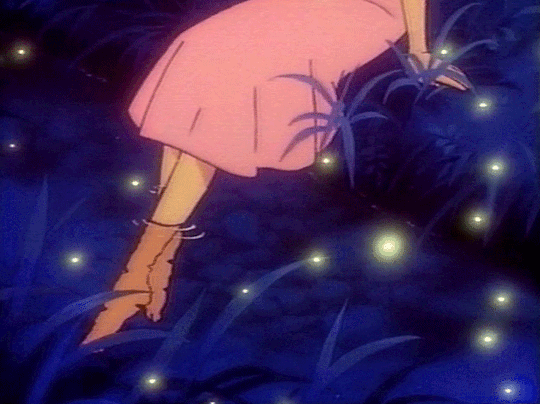
work by astrobydalia
#astrology#astro#astro observations#astro notes#zodiac#birth chart#astrobydalia#astrology observations#astro community
1K notes
·
View notes
Text
The Power of a Name
With @next-pharaoh
The power of a name is something more influential than most people realize. It created an individual, maintained their identity that had been crafted from the womb up until that very point. It interacted with the world around them, choosing their friends, their enemies, their brothers and their lovers. Names decide brains or brawns, cools or fools, the ins and the outs of every living thing. If it was not for names, then who would we even be?
So imagine the power of a name when it is used for the good of a movement, one that has been silently expanding for hundreds of years. While other cultures were fighting wars and attempting to outscore one another, this particular movement stealthily expanded its ranks. Lineage and ancestry can be traced back through countless generations of the male line thanks to this work. Of course, we are speaking of Arabization.
There are obvious reasons as to why this movement is so strong and only has the potential to further dominate. First and most importantly, the Arab-Islamic culture exemplifies masculine ideals, creating stronger men after every new breed. Higher testosterone levels, unbreakable fraternal bonds, governing genetic codes. Their desert-bound history created more aggressive, competitive, and territorial behavior; their strict religious conviction maintain higher levels of confidence and, by right, superiority.
But if this movement is silent, then how are we able to visualize its effects? Consider the following facts: While numbers in almost all historically-dominant religions are dropping, the current Muslim population is predicted to grow more than twice in size by 2060. Islam, and the core values of Arabization along with it, will surpass Christianity as the largest religion in the world in just 25 years.
Reflecting on a local level will help illustrate these details. The branch of mathematics most widely practiced, taught, and respected is algebra, a rhetoric developed into what we use today by Muslim scholars. Arabic speakers have increased by 276% since 1910, with English speakers at 221%, Hindi speakers by 118%, and Mandarin Chinese speakers only by 96% over the same period. The Arabic name Muhammad has risen to become the top-reported baby name in the entire world when all its spellings are counted together, with Amir, Malik, Nasir, and Xavier following close behind.
With all this in mind, how has the Arabization movement utilized the power of a name? How about we make this more personal. Consider the average man, 25 years old, 5’9, and weighs roughly 197 pounds. He is flabby and balding, already considered past his prime at such a young age. Works a meaningless job, lives a meaningless life. His pale skin is a reflection of the blank resume representing his past, present, and future. All this, until a guiding Arab brother calls him by the wrong name.
“Omar!” Omar? But that was not his name. “Omar!” He hears it again, this time from a local. Eventually it seems to resonate with the people around him. At first, this average man was puzzled, but the constant repetition of the name gradually begins to rub softer, washing over his body and smoothing out his ridges. Every "Omar" scrubbed off a piece of his past, better aligning him with a brighter, browner future.
It could start somewhere as vulnerable as porn, the average man filtering through and discarding any videos that do not feature the Arab male. Perhaps his playlists begin to reformat with Arab music, its rhythms and verses constantly playing to further seep into his brain. This restructuring can appear in the home too with a space decorated by Arab imagery, and like a vine it delicately extends further inwards and invades the average man’s very place of rest.
Soon, his interactions with the world around him begin to change. A new Arabic word slips into his everyday language, his connections and role models shift to solely Islamic men, his clothing habits adapt to his beckoning lifestyle. Generic becomes expensive, branded athleisure wear, business becomes religious attire. Each time that new name is uttered, the “Omar” inside inches a little further out.
Eventually, that “Omar” has extended far enough that the results become visibly present. The average man grows taller, broader, his fat stretched against a burgeoning muscular glory. Arms bloat thicker, legs bulge wider. His skin bronzes into a shade of brown that can only be defined as perfection, his hair blackens and thickens across his entire body. The jaw stretches, the nose inflates, the brows and lips protrude. And so too does the average man’s package, its sole purpose to breed future Arabs with its potent seed.
And once "Omar" passes the point of resonation and reaches familiarity, the average man will vanish. The power of a name, his name, Omar, means “long-living, flourishing” in Arabic, his language. And he represents it. An alpha male, an Arab male, a purebred Muslim who understands his mission. So now, Omar takes out his phone and texts a complete stranger, another average man, and simply addresses him as "Ahmed". And the cycle begins once more, the power of a name exploited for the greater good of Arabization.

512 notes
·
View notes
Text
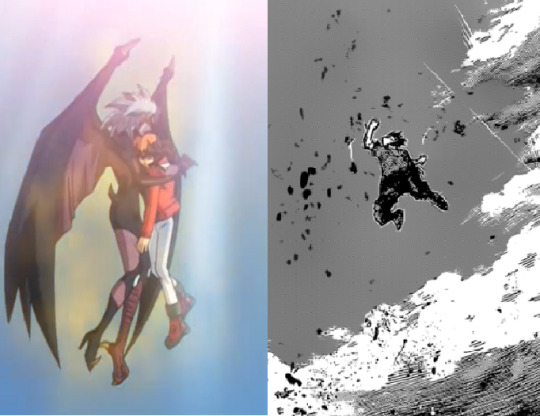
SHIGARAKI VS. YUBEL: HOW TO SAVE YOUR VILLAIN
The failure of Deku to save Shigaraki isn’t just a tragic conclusion for Shigaraki’s arc, it’s also My Hero Academia failing as a story. When I say the story failed, I mean the story has failed to answer any of the questions it asked its audience. It’s themes, character arcs, everything that communicates the meaning of the story to the audience is no longer clear.
Saving Shigaraki was the central goal of not only the story itself, but the main character Deku. By failing in its goal you can’t call this a good ending. In order to illustrate why this goal of saving the villain is so important to both Deku’s character and the central idea of MHA, I’m going to provide a positive example in Yu-Gi-Oh GX were the main character Judai successfully saves their villain. One of these stories fails, and the other succeeds. I will illustrate why under the cut.
BROKEN THEMES = BROKEN STORY
When artists draw they have to consider things like perspective, anatomy, shading, light, coloring. Drawing has rules, and it’s hard to produce good art without knowing these rules beforehand. If I draw something that has bad anatomy, you can criticize me for that.
Writing has rules, just like drawing. The rules of storytelling are important because writing is an act of communication. You can write whatever you want, just like how you can draw whatever you want, but if you break the rules the audience won’t understand what you are trying to communicate.
When I refer to MHA as a broken story, I am referring to the fact that it has broken the rules of storytelling. As this youtuber explains.
“I guess we should first define what broke and broken even means in this context. Has the story turned into an unintelligible mess? Not really. Value judgements aside, the narrative is still functional and fulfills the criteria of being a story. So how can a story that still functions be broken? Maybe to you it cannot. But to me a story that is still functional isn’t enough. What I mean when I say MHA is broken is that it’s lost something crucial. A codifying style of structure, pacing and payoff that until a certain point was the core of its identity.”
I could launch into a long-winded explanation of what themes are, but for the sake of simplicity I like to define themes in terms of “Ask, and answer.” The author asks a question to the audience, and then by the end of the story provides an answer. The audience is also invited to come up with their own answer which prompts them to think about the story on a deeper level. The question both MHA and GX are asking both its main characters and the audience is “Can you save the villain?” with the additional complicated question of “Should you save the villain?” This post will detail how both stories go about answering those two questions, and more importantly why those answers matter for the story.
With Great Power… You know the rest.
My Hero Academia and Yu-Gi-Oh Gx are actually similar stories once you get past their superficial differences. MHA is a story with way better worldbuilding, compared to a society where everything revolves around the trading card game, and people go to school to be better at a trading card game.
However, if you get past that. They are both bildungsroman, stories about the main characters growing up into adults. They both have an academy setting where the goal is for the main character to graduate and enter the adult world. They are both shonen manga. GX is the sequel of Yu-Gi-Oh a manga that ran in Shonen Jump the exact same magazine as MHA. The biggest point of comparison is their main characters, who both start out as young and naive who are driven by their admiration of heroes. Deku is a fan of All Might who wants to become a hero despite not having a quirk, because he loves All might who saves everyone with a smile. Judai’s entire deck archetype revolves around “Elemental Heroes’ and later “Neo-Spacians” who are all based on popular sentai heroes like ultraman.
The central arc for both characters is to grow up. Growing up for both of them not only requires figuring out what kind of adult they want to be, but also what kind of hero they want to be.
Now I’m going to drastically oversimplify what a character arc is.
A character arc first starts out with the character being wrong. Being wrong is essential because if the character is right from the beginning, then there’s no point in telling the story. A character often holds the wrong idea about the world, or has some sort of flaw that hinders their growth. The narrative then needs to challenge them on that flaw. It usually sets up some kind of goal or win condition. That flaw gets in the way of a character “winning” or achieving their goal, so they need to fix that flaw first. If their ideals are wrong, then they need to think about what the right ideals are. If they’re too childish, they need to grow up. If they have unhealthy behaviors or coping mechanisms, they need to unlearn it and require better ones. Otherwise, that flaw will keep sabotaging them until the end.
I’m borrowing the word “win condition” from class1akids here because it’s an incredibly appropriate terminology. Midoriya needs to do “x” in order to win, otherwise this victory doesn’t feel earned. The “x” in this case is usually character development. As I said before, a story where the main character hasn’t changed from beginning to end feels pointless. Especially in Deku’s case, he was already a brave, strong hero who would charge right into battle and defeat the bad guys in chapter one, so him defeating Shigaraki in a fist fight doesn’t represent a change.
The story sets up not only “What does the hero need to do to win?” but also “How does the hero need to change in order to win?” A character either meets these requirements before the end of the story, or they don’t and usually this results in a negative ending.
MHA in its first half quite clearly set up both the final conflict of saving the villains, and also that saving the villains is its “win conditions.” The hero shouldn't be allowed to win without first fixing this flaw.
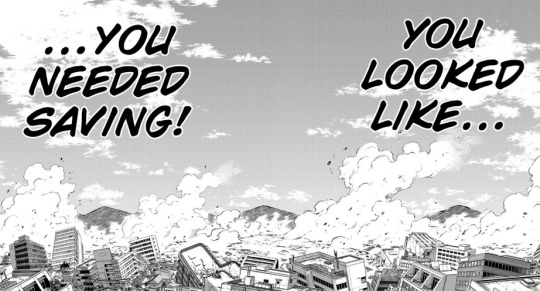
From this panel onward the central question Deku is forced to answer shifts from “Am I strong enough to defeat ShigarakI” to “Can I save Shigaraki?” However, much earlier than that All Might goes on to basically set up the win conditions of what makes the ultimate hero as someone who “Saves by winning, and wins by saving.”
All might: You can become the ultimate heroes. Ones who save by winning, and win by saving.
Therefore the story has set it’s criteria for what kind of hero Deku needs to become. If he wins without saving, then he’s failed to become what the series has set up as the Ultimate Hero.
Shigaraki and Yubel aren’t just narrative obstacles, or boss monsters to be killed like in a video game. They are narrative challenges, which means that the character can’t grow in any way if they don’t answer the challenge presented by the characters. They are villains who actively resist being saved, to provide a challenge for two heroes who define their heroism by saving others. The challenge they pose adds a third question to the story and the main characters.
"Can I save the villain?"
"Should I save the villain?"
"If I don't save the villain, then can I really call myself a hero?"
In other words the decision they make in saving, or not saving their final antagonist defines what kind of hero they are. In Deku’s case it’s even more critical he defines what hero he wants to be because the MHA is also a generational story, and several of the kids are asked to prove how exactly this generation of heroes is going to surpass the last one. The kids growing physically stronger than the last generation isn’t a satisfactory answer, Deku getting strong enough to punch Shigaraki hard is not a satisfactory answer, because we are reading a story and not watching a boxing match.
I’m going to focus on the last two questions though for a moment. Many people who argue against saving villains like Shigaraki argue he is a mass murderer and therefore isn’t worthy of salvation. However, the act of saving Shigaraki isn’t a reflection of Shigaraki himself, but rather the kind of hero Deku wants to be. It all boils down to Spiderman. In the opening issue of Spiderman, teenage Peter Parker is bitten by a radioactive spider and suddenly gains super strength, the ability to stick to walls along with other powers. However, being a teenager he uses these powers selfishly at first. He doesn’t feel the obligation to use his powers for other people, and therefore when he sees a robbery happening right in front of him he lets the robber go. However, because he lets the robber go, the robber then attempts to hijack a car and kills his Uncle Ben in the process. If Spiderman had stopped the robber then he might have prevented that from happening. He had the power to stop the robber, but he didn’t feel responsible or obligated to save other people. As a result Uncle Ben dies. It’s not enough to have power, ti’s how you use that power that reflects who you are, therefore: “with great power comes great responsibility.”
The choice to save Shigaraki actually has little to do with whether or not Shigaraki is redeemable, but rather how Deku chooses to use his power, and what he thinks he is responsible for reflects who Deku is as a person. Deku himself also clearly outlines how he wants to use his power, that One for All is a power for saving, and not killing.
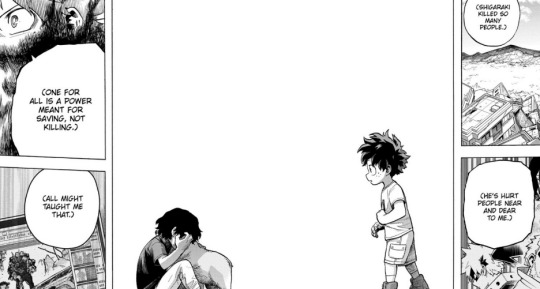
How he uses his power reflects Deku’s ideal in saving others, and therefore if he doesnt use his power to save, then he’s failed to live up to his ideals. It's not whether it's morally right to save a murderer like Shigaraki, but rather the way Deku wants to choose to use his power. It's about whether he feels the responsibility to save others.
Judai explores an incredibly similar arc to Deku. They are basically both asked what kind of responsibilities a hero is supposed to have, which is also a metaphor for growing up to handle the responsibilities of adulthood. As both characters start out with incredibly naive and childish ideas about what a hero is. Therefore realizing what a hero is responsible for is key to them growing as a character. However, Judai is different from Deku. In some ways he’s more like Bakugo. Judai is a prodigy who’s naturally good at dueling. He doesn’t duel to save others, but rather because duels are fun and he’s good at it. He’s very much like Bakugo, who admired All Might as a hero just as much as Deku did, but admired the fact that he was strong and always won rather than he saved others.
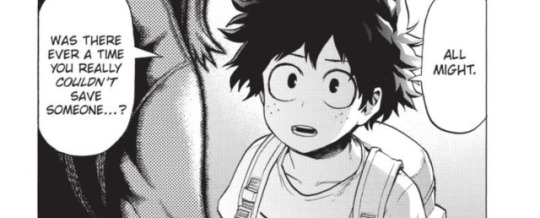
However, I would say both Deku and Judai are questioning what a hero is responsible for. They are both asking if they have the responsibility to use their power to save others. If they have to fight for other people, just because they have power. His first big challenge as a character comes from Edo Phoenix, who calls out Judai for not thinking through what it means to be a hero, and what responsibilities heroes carry. Judai duels because he thinks it’s fun. He will show up to duel to help his friends, but that’s because he’s the most powerful person in the group. Even then it’s because he finds fighting strong opponents to be enjoyable. Bakugo will beat up a villain, but for him it’s more about winning then if the action will save someone or not.
Judai is more often than not pushed into the role of being a hero, he doesn’t play the hero because he’s a particularly selfless person, and he’ll often avoid responsibility if not forced. He has power but no sense of responsibility and the narrative calls them out as a problem.
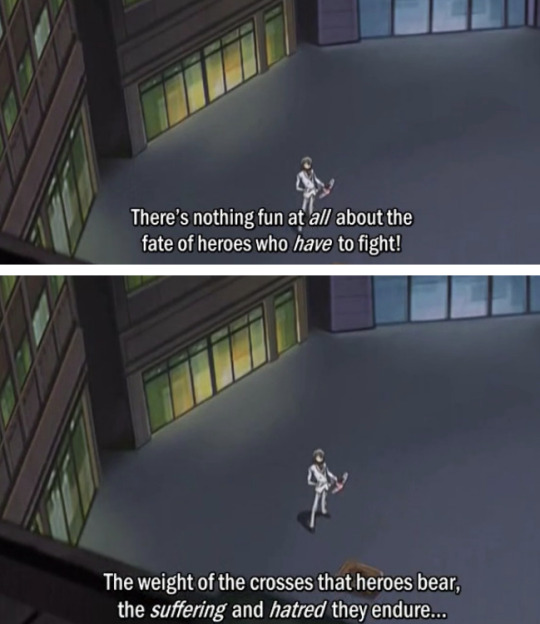
Edo: Can you even fathom that, Judai?
For Judai, he can’t understand the responsibility of being a hero. For Deku, he idealizes heroes so much he can’t understand that there are people out there the heroes have failed to save. These two callouts towards Deku and Judai are discussing similar because they’re both discussing where a hero’s responsibilities lie. Is a hero responsible for saving everyone? Is someone strong like Judai responsible for using their strength to help other people?
Judai’s arc continues into the third season where he’s not shown to just be naive but ignorant. He’s not just childish, he actively resists growing up because he doesn’t want to take on adult responsibilities.
THe same way that Deku just decides not to think about whether or not All Might failed to save people in the panels above. However, in Judai's case he's actively called out for his choice to remain ignorant.
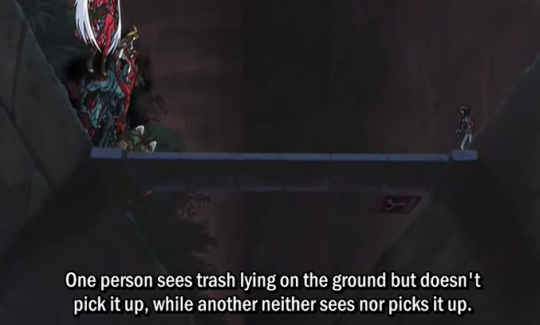
Satou: Now, which one is at fault? Judai: Isn’t it the guy who saw it, but didn’t pick it up. Satou: Not quite. If one is aware of the trash that fell, it may be picked up someday. But there is no possibility fo the unaware one ever picking it up. Judai-kun you are the foolish one unaware of the trash that has fallen. Judai: Are you calling me out for how I am? Satou: Your behavior towards me was atrocious. The worst was attending class only for credit, even if you were there you only slept. Judai: Yeah, I know. I was all bad, but it wasn’t that big a- Satou: It is important. You see, one by one, the students inspired by your attitude were losing their motivation. Now if you were a mediocre duelist, then this would not be an issue. Satou: However, you are the same hero who defeated the three mythic demons. Every single student in the academy admires you. You should have been a model for this academy. Judai: Me, a role model? Are you kidding? I just do whatever I feel like doing. Satou: Great power comes with great responsibility. Yet, as you remain unaware of that, you’ve spread your lethargy and self-indulgence.
seems like a minor issue, but look how Judai responds to the accusations. “I just do whatever I feel like doing.” Satou is arguing that Judai should pay attention to the influence he has on others because of his power, because how he chooses to use that power affects others. However, Judai chooses to actively not look at the consequences of his actions because he doesn’t want to take on that level of responsibility, and therefore he’s looking away from the trash.
While it seems like it doesn’t matter in Satou’s specific example, not thinking of the consequences, or how you use your power can have unexpected consequences. Spiderman doesn’t feel like it’s his responsibility to stop a bank robber, and that bank robber shoots his uncle. You could still argue it’s not Spiderman’s responsibility to stop every crime in the world, and I guess no one owes anyone anything from that point of view - but Spiderman failing to act responsibility had the consequence of directly hurting someone else.
Spiderman has to live with that consequence because it was his own Uncle that was hurt. This is where we really reach the duality of Judai.
In GX, Judai is, symbolically speaking, The Fool of the Tarot Deck, the Novice Alchemist — a person brimming with infinite potential, yet one who is also supremely ignorant, who walks forward with his eyes closed and often unknowingly causes harm in his great ignorance. In this, he is very much the embodiment of the faults we most commonly associate with teenagers — selfishness, recklessness, shallowness, a lack of dedication or empathy when it’s most needed. Like most people, he has good traits that work to balance out some of the above, but his narrative path through GX ends up being that of the flawed hero undone by his faults — and then that of the atoner, the repentant sinner. In his case, the mistakes of his teenage years are the catalyst for his growth from a boy into a man burdened with duty and purpose. Judai is someone with infinite potential, with great power, but also ignorant on how he should use that power, and that makes him an incredibly flawed hero who needs to learn how that power should be used.
Deku similarly exists in a society where heroes deliberately turn a blind eye to the suffering of a certain type of victim. Shigaraki’s speech heavily resmebles Satou’s speech about garbage on the side of the road.
Shigarali: "For generations you pretended not to see those you coudln't protect and swept their pain under the rug. It's tainted everything you've built."
Deku shares Judai’s ignorance, because he’s not only a part of a system that doesn’t even see trash on the side of the road, but he also worships heroes so much that he’s incapable of criticizing them. If Deku saw the flaws of heroes, but at first didn’t have the courage to speak out, but eventually gained the courage that would be one thing. However, if he doesn’t see the flaws of heroes, then the problem will never be fixed.
There are also consequences for both Judai and Deku failing to use their powers responsibly. These consequences take the form of the villains who came about because of all of society’s ignorance to the suffering of victims (Shigaraki) and because of the main character’s ignorance to their suffering (Yubel). Shigaraki and Yubel are also explicitly victims that the heroes failed to save, turned into villains who are active threats to the heroes.
Should I save the villain?
The answer is yes, because the decision to save is reflective of the kind of hero each character wants to be. Each story clearly sets up that Deku and Judai aren’t punisher style heroes who shoot their villains, they are being set up as heroes who save. Deku needs to “save by winning.” As for Judai, a big deal is made of Judai’s admiration for another character Johan who represents a more idealistic kind of hero. Johan unlike Judai is someone who duels with a purpose, something Judai outright says he admires because he’s empty in comparison.
Judai: Johan what have you been dueling for? See, it’s about fun for me… Well, for the surprise and happiness too. I guess I do do it for the fun. Sorry, I guess I put you on the spot by asking out of nowhere. Johan: What’s this about Judai? Judai: It’s nothing. Johan: I suppose there is one goal I have. Johan: Even if someone doesn’t have the power to see spirits, they can still form a bond with a spirit. That’s why I do it for people like him. [...] Johan: I'll fight for everyone who believes in me, and I'll do it with my Duel Monsters. Judai: I'm jealous you've got feelings like those in you.
Becoming a hero who uses their power to help others isn’t just a goal the story sets for Judai, it’s a goal that Judai sets for himself because of his admiration for Johan. Johan represents the idealistic hero Judai wants to be, but is also held back from because of his personality flaws. Johan represents the kind of heroic ideal that Deku is aspiring to be.
Johan’s ultimate goal isn’t punishing the wicked, but to use his power to save others.
Johan: Judai, it was my dream to save everyone through my dueling!
The story sets up the idea that it’s not enough for Judai to simply be strong, he’s also challenged to become a savior who uses his power to help others like Johan. Deku needs to “save by winning” and Judai needs to “Save everyone through his dueling.” However, Johan also adds another condition to what saving means. His idea of saving isn’t to defeat a villain, but rather his dream is to help connect spirits and humans together, even if there are humans who can’t see spirits. Johan doesn’t save people with the power of physical force, but rather the power of human connection.
Should I save the villain?
Here the answer is "Yes", because wants to become more like Johan someone who uses their power to help others not just for themselves. Then we reach the third question
If I don't save the villain, can I really call myself a hero?
It once again comes to power and responsibility. Heroes have great power, and they are responsible in how they use that power, if they use it irresponsibly then there are consequences. Shigaraki wants to destroy hero society, because the heroes irresponsibly use their power to turn a blind eye to everyone’s suffering.
People suffer when heroes fail to live up to their responsibilities. The entire conflict of season 3 is created by Judai failing to save Yubel. If Judai had helped Yubel when they most needed it, instead of abandoning them, then Yubel would never have been twisted by the light of destruction, would never have attempted to teleport the school to another dimension, would never have attacked all of JUdai’s friends.
These consequences matter. Deku can turn his eyes away from Shigaraki’s suffering, but let’s say a hero failed to stop a robbery, or rather he didn’t even try, and because of that his mom was shot and died in the street. Would Deku consider the man who failed to stop a bank robbery a hero? When Spiderman let a bank robber go instead of trying to stop him, was he being a hero in that moment? Both the stories and the characters themselves have defined heroes as people who use their powers to save others, therefore if Judai and Yubel fail to save their villains then they can’t be called heroes by the story’s own definition. Now let’s finally return to the question of "Can I save the villain?"
Was there ever someone you couldn’t save?
m going to start with Yu-Gi-Oh Gx as a positive example of how to save your villain. Gx works for two reasons. One, it’s established from the start that Yubel isn’t beyond salvation, and two, it makes it so Judai can’t win without saving Yubel. The conflict of the story does not end until Judai makes the decision to save Yubel. In some ways the writing is even stronger because Judai is directly responsible for the pain and suffering that Yubel went through that turned them into a villain in the first place. Yubel isn’t just a victim, they’re specifically Judai’s victim.
Yubel is a duel spirit who is also essentially Judai’s childhood friend. A duel spirit just like the kind that Johan wants to save. During their childhood Yubel got too overprotective of Judai, and started to curse his friends for making him cry or upsetting him in any way. Until everyone Judai’s age started avoiding him and Judai became all alone with only Yubel for company. Judai’s decision was to abandon Yubel at that time. He took the yubel card and shot them into space, hoping that being bathed in space rays will somehow “fix” what was wrong with them. I know that’s silly but just go with it. Judai abandoning Yubel had the unintended consequence of Yubel being subjected to the light of destruction, a corrupting light that subjected Yubel to years of pain. This pain literally takes the form of Yubel burning alive.
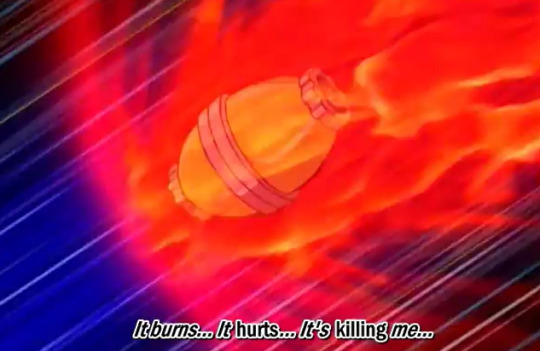
Yubel connected to his dreams called out for Judai every night, only for Judai’s parents to give him surgery that repressed his memories of Yubel causing him to forget them entirely. Yubel then spent the next ten years alone in space, continuously subjected to painful torture, with their cries for help being ignored.
"I was suffering even as you came to forget about me..."
Yubel is then met with the question of how can Judai treat them this way if they loved him so much? As from Yubel’s perspective, they’ve only ever tried to protect Judai, only for Judai to not only throw them away, but subject them to painful torture and ignore their cries for help. Judai effectively moves on with his life, goes to duel academy, makes friends while Yubel is left to suffer in silence all but forgotten. This is where Judai’s ignorance has serious plot consequences.
It’s not just the pain that Yubel endured that made them snap. It’s that their pain went ignored.
Yubel holds out the faint hope that Judai will answer their calls fro help until they finally burn up upon re-entry into earth’s orbit. At which point they’re left as nothing more than a single hand crawling on the ground. Yubel who cannot fathom why Judai would cause them so much pain, and then forget about them, convinces themselves that Judai must be causing them pain, BECAUSE he loves them.
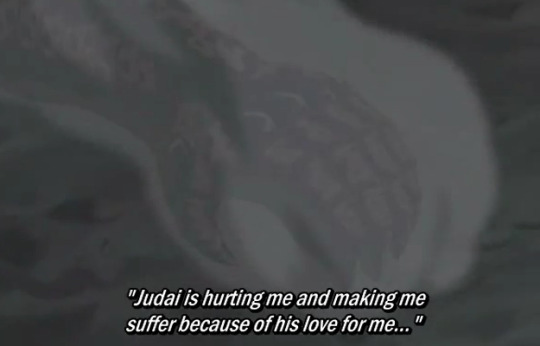
But you see, I couldn't possibly forget about you in the time that I've suffered...
Judai is allowed to move on with his life, to make friends, to spend the next ten years doing so while Yubel is subjected to ten years of agony. When they finally escape their painful torment, they see all the friends Judai has made while they’re left alone and forgotten. However, Yubel’s goal isn’t revenge. Rather, it’s to make Judai share and recognize their pain. WHich is why I said it’s not the fact that they were made to suffer, but their suffering is ignored. Yubel’s entire philosophy revolves around the idea that sharing pain is an expression of love, and that they and Judai share their love for each other by hurting each other.
"That's why I sought to fill all those linked to you, your world, with both sadness and anguish..."
For Yubel, making all of Judai’s friends suffer and Judai themselves suffer is a way of making them and Judai equals again. They want to show “their love” for Judai, but it’s more about forcing Judai to recognize the pain he’s caused them by forcing him through the same pain. Yubel’s philosophy of sharing pain is actually a twisted form of empathy.
They’re not entirely wrong either, that even people who love each other can cause each other pain, and that if one person is suffering alone in a relationship or the suffering is one-sided then there’s something wrong with that relationship.
Yubel: I get it now… You weren’t in love, with Echo. Yubel: No.. you may have loved her just enough to clear the conditions in palace for you to control Exodia, but the you didn’t truly love each other. Yubel: You were only unfairly hurting her, while you stayed unharmed. You wouldn’t suffer. You wouldn’t suffer. You wouldn’t be in pain. Amon: What are you getting at? Yubel: I’ve been hurt! I’ve suffered! I’ve been in pain. That’s why I’m making JUdai feel the same things I did!
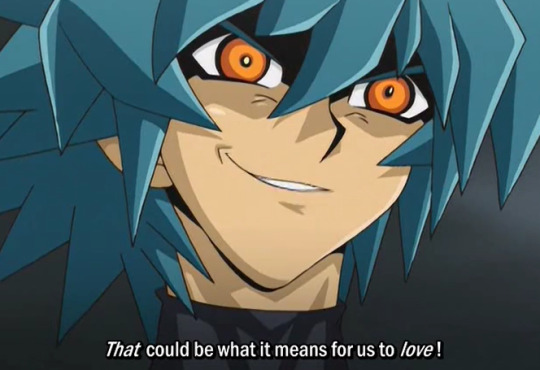
Yubel’s twisted theory of love, is a pretty thinly veiled cry for empathy.
They break out into tears when talking to Amon about the way they’ve hurt and suffered. They clearly state upfront that their goal is for Judai to recognize their love. One of the first things they say to Judai is a plea for Judai to remember them.
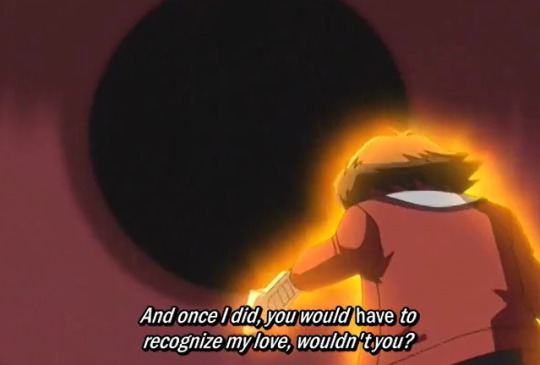
Yubel is presented as a very human character suffering through a lot of pain throughout their entire villai arc, they break down into tears multiple times, they cry out in agony, they're visibly suffering and you see their mental walls begin to break down when Judai denies them any empathy.
Yubel is actually incredibly clear and straightforward about their desire to be saved by Judai. However, Judai doesn’t lift a single finger to help Yubel the entire arc, even though they themselves admit they are directly responsible for Yubel’s suffering but they helped create who they are today.
Judai plunges into a different dimension and gives up everything to save someone, but it’s Johan, not Yubel they try to save. You have Johan, the perfect friend, and perfect victim that Judai gets obsessed over and will not stop at anything to save, and then you have Yubel, the imperfect victim that is actively harming Judai and all of his friends that Judai chooses to ignore. The whole season Judai only focuses on saving the perfect victim Johan, and this is clearly shown to be a flaw. Judai doesn’t just ignore Yubel to save Johan, he also ignores every single one of his friends.
Judai only caring about saving Johan, and deliberately ignoring and abandoning the friends who came with him to help, essentially abandoning them the way he did Yubel leads to another consequence. After he abandons them they get captured, rounded up, and actually die and become human sacrifices.
Losing his friends, causes Judai to snap. Judai becomes the supreme king and decides power is all that matters; he starts killing duel spirits en masse in order to forge the super polymerization card. Which means being left alone, suffering alone, being abandoned by everyone causes Judai to snap the exact same way that Yubel did.
In fact Judai is only saved from his darkest moment, because two of his friends sacrifice their lives, trying to get through to him and appeal to his humanity. At that point Judai’s friends could have just chosen to put him down like a mad dog, to punish him for the amount of people he’s killed, but instead they try to save him because of their friendship.
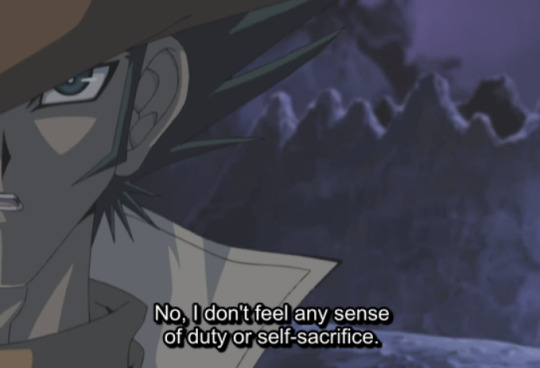
I just want to save my friend. That is all.
By the time Judai is facing Yubel in their final fight, Judai doesn’t have the moral highground against Yubel in any way whatsoever. They’ve both lashed out because of the pain they endured and killed countless people in the process of lashing out. The only real difference between them is that Judai is lucky. He had friends to support him at his lowest point, while Yubel didn’t. Does Judai learn from Jim’s example, and go out of their way to save Yubel the same way they were saved because Yubel is still a friend? Nope, Judai tries to kill Yubel at this point.
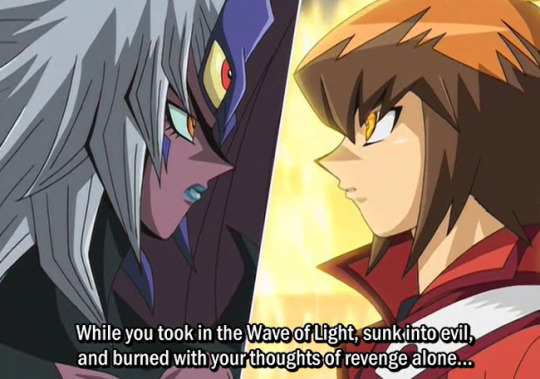
I made a lot of friends... And they all taught me something… real love is wide enough, large enough and deep enough to fill the universe. Your so-called love is only a conceited delusion.
Like, Judai, sweetie baby honey darling. How was Yubel supposed to make friends when they were floating in the empty void of space?
Judai hasn’t learned, they are still ignorant, and still turn a blind eye to Yubel’s suffering. After all if his love is wide enough, large enough,and deep enough to fill the universe then why don’t thy have any room in their heart whatsoever for empathizing with Yubel?
Judai making friends while Yubel was trapped in space doesn’t make Judai a better person than Yubel, it makes Judai lucky. Judai doesn’t even appreciate that luck, because he treats his friends like garbage. It’s not about whether Yubel is worthy of salvation, because Judai is a mass murderer and his friends still went to great lengths to save them anyway. It’s that Judai doesn’t want to empathize with Yubel, because they still want to remain ignorant and irresponsible. Judai wants to continue playing hero, with a very black and white definition of what a hero is. By this point Judai’s killed lots of people, but if he makes Yubel the villain in the situation, he can keep playing hero. He doesn’t have to look at himself and what he’s done, because blaming everything that happened on Yubel and then putting Yubel down like a mad dog allows Judai to absolve his own guilt. Judai practically ignores Yubel’s cries for help, even when Yubel spells it out for them.

I couldn't have lived with the heartache unless I felt that I was being loved...
At this point Yubel themselves acknowledges that their love was just a delusion. That it was a coping mechanism, because they couldn’t live with all the pain otherwise. WIthout it they would have just died, which makes Judai unmoved. The implication here is that Judai thinks yes, Yubel should have just died in that crater. It would have been easier for Yubel to die a perfect victim, then for Yubel to crawl out of that crater and go on to hurt other people. While that may be true the same can be said for Judai - it would have been better if Judai died rather than become the Supreme King. His friends could have put him down like a mad dog, you could have even called that justice - but they didn’t. Judai making no attempt to save Yubel isn’t because he thinks it’s morally wrong to save someone who’s killed as many people as Yubel has, or because he thinks he can’t forgive Yubel, it’s because Judai is taking the easy way out. Johan is a nice, easy victim to save, because he’s Judai’s perfect boyfriend, while Yubel is a complex victim that requires Judai to understand their suffering. Even the act of saving Johan isn’t about Johan himself, it’s about the fact that Judai feels guilt over Johan’s disappearance. What Judai wants isn’t really to save a friend, but to stop feeling guilty over that friend. Judai isn’t just disgusted by Yubel’s actions towards his friend, he also wants to avoid the guilt he feels over causing all of Yubel’s suffering, because it requires acknowledging the complex reality that he is both victim and perpretrator in this case, just as Yubel is both victim and perpetrator.
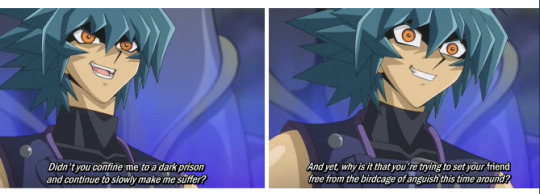
So how can an arc where Judai doesn’t try to save Yubel until the last possible minute, be better than an arc where Deku makes it his goal for the final act of the manga to save the crying boy in Shigaraki?
It’s because the story does not let Judai get away with his continual refusal to empathize with Yubel. Yubel’s entire character revolves around empathy, in the form of sharing pain. As a duel monster, Yubel’s effect is that they are a 0/0 attack monster who is immune to all damage, but when you attack them they deal all the damage back to you. Which means that Yubel will respond to all the pain they feel, by causing you just as much pain in return. Yubel is not a character who can be defeated in a fight, or a duel. In fact they’re the only Yu-Gi-Oh villain who never loses a duel once. The most Judai can do is duel them to a draw, and they draw three times. Yubel wins against everyone else who challenges them. In a way Yubel is like Shigaraki, the ultimate, unkillable enemy that can’t be done away with violence. Judai’s refusal to empathize with Yubel or attempt communication also makes them worse, every time Yubel is hurt they escalate. THe more Judai hurts them, the more they will hurt in return, it’s a cycle that will never be broken simply by killing Yubel, because Yubel is unkillable.
Not only that but the story has gone to great lengths to show that saving Yubel is the correct course of action. If Judai doesn’t save Yubel, he’s basically spitting on the selflessness Jim showed in saving him. In fact if he doesn’t save Yubel, Judai is contradicting his own words on what makes a good friend. Sho once asks Judai after witnessing his brother change, what he should do if a person you lov ehas changed into an entirely different person. What if they're a person you don't even recognize any more? A person you don’t even necessarily like anymore?
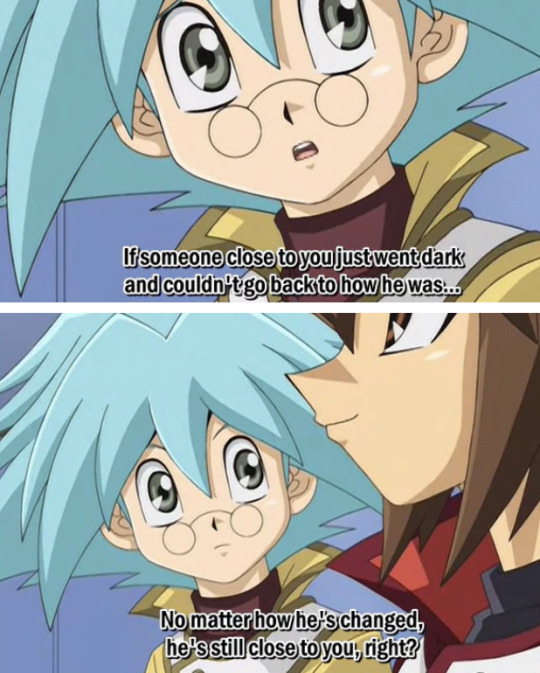
That's why if it were me. I'd probably just be looking after him until the very end, even if I didn't like him. I'd do it cause I think it'd prove that I care about him.
Judai doesn't even say that Sho is obligated to save his brother or morally redeem him, just that he has to keep looking at him instead of turning away or ignoring him.
Judai is being a bad friend, by his own definition. By choosing to deliberately look away from Yubel, Judai’s not living up to his advice for Sho for how you treat people you care about.
Which is why the resolution for Judai and Yubel’s arc is so important, because it’s done by Judai finally acknowledging Yubel’s pain, and promising to watch over them from now on, words that are followed by the action of physically fusing their souls together so they’ll never be alone again. Judai doesn’t just say pretty words about how they won’t ignore the crying child inside of Yubel, but instead he makes a sacrifice to save Yubel at risk to themselves to show their words are backed up by actions. Judai says Yubel will never be alone again, and then he commits.
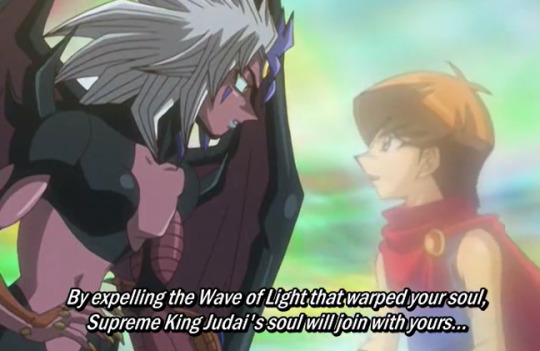
"And even if that means I won't exist anymore... I don't care."
Judai has resolved his character arc by this action, because Judai is finally taking on responsibility and that responsibility is watching over Yubel, so the two of them can atone together. Judai even says himself this isn’t an act of sacrifice on his part, but rather him finally accepting adult responsibilities.
Judai: I wouldn't sacrifice myself for you guys. I'm just going on a journey to grow from a kid into a man.
Judai needed to save Yubel to complete his character arc and grow as a person. If Judai hadn’t saved Yubel, he would have still remained an ignorant child. By learning not to turn a blind eye to Yubel’s pain, and also smacking sacrifices and physically doing something to atone for the way they ignored Yubel up until this point they’ve not only saved Yubel they’ve also done something to address their wrongs. This also continues into the fourth season where Judai’s personal growth results in him learning what kind of hero he wants to be as in Season 4 in order to atone for the spirits that Judai slaughtered, he decides to leave his friends behind and walk the earth with Yubel helping spirits and humans get along with each other. In fact Judai’s final speech as a character isn’t even about how strong he is as a hero, but how weak he is as a person.
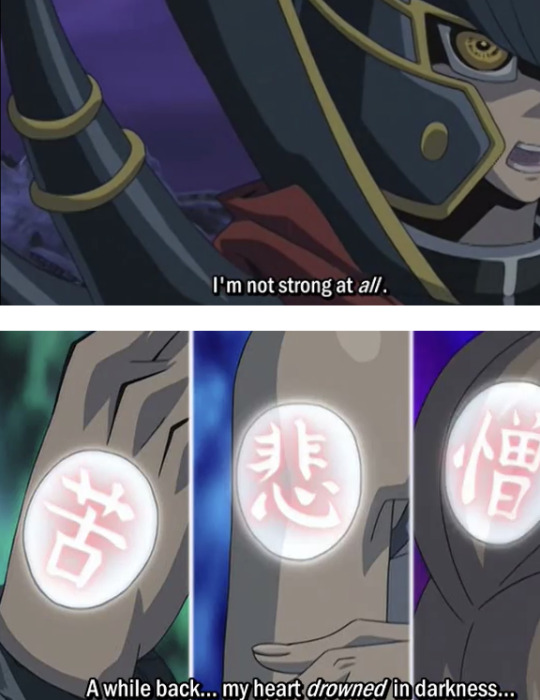
And I put my friends through some rough times. Form that, I figured a few things out... all I can do is believe in them.
The lesson Judai learned is because he’s weak, he needs to empathize and believe in other people the same way that his friends once believed in him when he was at his lowest point. Judai’s not the strongest hero, he’s the weakest one, but that gives him the ability to empathize with people who were lost just like he was, and guide them back from the darkness.
The story of how Deku became the worst hero.
I’m going to say this right now it might turn out next week that Shigaraki is just fine, and he’ll use the overhaul quirk to reconstruct his body. However, even if that happens Deku has completely failed at his goal of saving Shigaraki for the reasons I’ll illustrate below. In theory, Deku’s arc of saving Shigaraki, and therefore winning by saving should be much easier for the story to accomplish and also much less frustrating to watch. After all, Shigaraki has been around since the beginning of the manga, he’s literally the first villain that Deku faces. He’s also the first villain that Deku talks to, where he brings up the idea that there were some people All Might failed to save. There’s also many intentional parallels between the two characters, the entire manga is about their parallel journeys of becoming the next generation hero and the next generation villain. Shigaraki even directly quotes the line at one point that all he wanted was for someone in his house to tell him he could still be a hero, the same line Deku said in the first chapter was that he wanted his mom to tell him to be a hero instead of apoalogizing to him for being quirkless.
Not only is the setup for Shigaraki and Deku made obvious (Deku can redeem Shigaraki by telling him that he can still be a hero too), but Deku himself states out loud that he wants to save the crying child inside of Shigaraki.
Judai runs away from Yubel the whole time, whereas Deku is running towards Shigaraki and actively makes it his goal to understand Shigaraki and continue to see him as a human being rather than a villain. The story also makes it clear that saving Shigaraki is necessary to saving hero society as a whole. After all Yubel is just Judai’s victim. Whereas Shigaraki is the victim of all of society. He’s the crying child who was ignored. The cycle won’t be broken if heroes continue choosing to ignore people like Shigaraki, because more victims will grow up to replace him.
Shigaraki: Everything I've witnessed, this whole system you've built has always rejected me. Now I'm ready to reject it. That's why I destroy. That's why I took this power formyself? Simple enough, yeah? I don't care if you don't understand. That's what makes us heroes and villains.
Shigaraki rejects the world because the world continues to reject him. THe solution to this problem is not rejecting Shigaraki, because Shigaraki won’t go away, the system will just continue to reject people like Shigaraki. As long as heroes and villains don’t understand each other, they’ll keep being forced to fight and the conflict won’t end, because hero society is what engineers it’s own villains.
clear as day by the story itself. If the objective of saving Shigaraki is clear, then how exactly did the story fail in this objective? What went wrong? In this case it’s a failure of framing, and breaking the rules of “show don’t tell.” Stories are all about actions and consequences. When a character makes a certain action in a story, the way other characters around them, the world, and whatever consequences that action frames that action in a certain light. It provides context for how we are supposed to interpret that character in that moment.
For example, when a character does something wrong and another character directly confronts them over what they did wrong, that frames them as in the wrong. The story is criticizing the character for what they did wrong. Context is everything in a story. Stories are just ideas, so they require framing and context to communicate those ideas for the audience. Certain character attributes can be strengths or flaws depending on the context. My go to example is that if you put Othello in Hamlet, the conflict would be resolved in five seconds because Othello’s straightforward personality and determination would have him kill Hamlet’s uncle without questioning things. Whereas, Hamlet constantly questioning and second guessing himself would lead to the worst ending possible. However, if you put Hamlet in Othello, then Hamlet wouldn’t fall prey to Iago’s manipulations, because Othello doubts and questions everything so he wouldn’t believe Iago the way Othello did.
Hamlet’s contemplative and introverted nature can be a strength in one situation, and a flaw in another. Othello’s tendency to act without thinking things through can be a strength in one situation, and a flaw in another. Context matters, because context tells you how you’re supposed to interpret a certain characters actions, and therefore tells you more about that character. This is why people repeat “Show don’t tell” as the golden rule of storytelling, it’s one thing to say something about a character, it’s another to us the characters actions in the story itself to show them something about the character.
What’s even worse then breaking the rules of show don’t tell however, is telling the audience one thing, and then going onto show in the narrative something completely different. In that case the narrative becomes muddled and confusing to read. If I the narrator say “Hamlet is someone who overthinks everything” and then in the story Hamlet walks up to his uncle and kills him with no hesitation, then the narrator is straight up unreliable. It becomes impossible to tell as an author what message I’m trying to get across about these characters, because I’m telling you one thing and showing another.
This is why the writing fails in the second half of My Hero Academia because we are constantly told one thing, but then the story shows something entirely different and sometimes even contradictory to the thing we are being told.
Judai is a much worse hero than Deku, he always runs away from Yubel, and we’re never directly told that he’s supposed to save Yubel either. However, the narrative is incredibly consistent. Judai’s behavior of running away is consistent with his character. All the other character call Judai selfish for abandoning his friends (and they’re not even talking about Yubel). Judai is never painted in any positive light for his actions, therefore we as the audience understand Judai’s behavior is wrong and he needs to fix it. The narrative makes it clear that Judai needs to grow up, and Judai is never rewarded for his refusal to grow up, he’s ruthlessly chewed out, not by his enemies but also by his own friends. However, the narrative isn’t merciless on him either. Season 3 of GX is dark, but it’s not grimdark. Even when Judai loses his way, he’s still shown love and compassion by those same friends who go to great lengths for his sake. The narrative criticize Judai but it never insists that he’s beyond redemption and needs to be put down like a mad dog.
The message is very clear, that not only does Judai need to grow up, but he also deserves the chance to grow and change, which is why he should give Yubel a similar chance. In comparison the story sets out this clear narrative arc for Deku of understanding Shigaraki, but it never challenges him for failing to understand Shigaraki. If you listen to what the narrative says, how other characters describe Deku, and what Deku himself says and only read it on a surface level then yes, Deku’s goal is to save Shigaraki. If you analyze actions however, he is in effect just like Judai he never takes any meaningful action or steps towards Shigaraki, nor does he think of what saving Shigaraki might look like or entail.
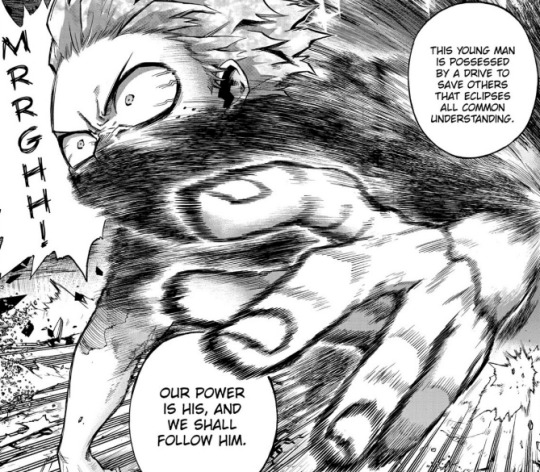
The story describes Deku as someone who is possessed by a drive to save others that eclipses all common understanding, but does the story give us any examples of that behavior?
Judai is characterized as a selfish, irresponsible child, and the story gives us countless examples of his immaturity and how it hurts others. Does the story of MHA do the same for Deku's purported virtues? Let’s run through Deku’s actions, step by step, the actions themselves and how they are framed in order to find any evidence that Deku possesses this drive to save others. Does Deku reflect at all on the question of:
Can Shigaraki be Saved?
Deku leaves on a journey to try to understand villains. When he makes a perfunctory attempt to understand and empathize with Muscle, and Muscle replies that some people are just evil does Deku keep trying to reach his heart? Nope, he just punches him.
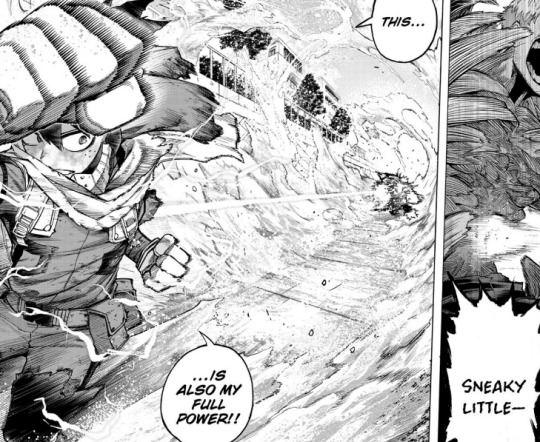
Well, if he’s failed in his goal of understanding a villain then does the story call him out on his failure? Does Deku face any sort of narrative consequence for that failure? Is he framed negatively for failing to understand Muscle, the same way that Judai is framed for abandoning Yubel? Nope. Deku doesn’t express any frustration at all over is inability to reason with Muscle. There’s also no negative consequence for Deku just choosing to punch muscle, it turns out that there was no reasoning with Muscle and some people are just bad eggs so Deku was right. It’s okay for characters to fail, but if a character fails and it’s not framed by the story as a failure then the writing itself as failed. Why even bother to include this scene in the first place if it doesn’t advance Deku’s character in any way? This scene in spite of showing Deku failing to understand someone actively paints Deku in a positive light, because of how much stronger he is ow that he can OHKO a guy that gave him trouble all the way back in the camp arc.
This scene doesn’t tell anything about Deku as a character, it just makes him look cool. In fact that’s precisely the problem, Deku isn’t adequately challenged as a character, because he’s never allowed to fail. Even when he does obviously fail at the things the narrative set out for him to do, he’s never challenged on those failures, because the priority isn’t to make Deku grow, it’s to make Deku look good. As I said before, Judai is the hero because he’s the weakest. Deku is the hero because he’s the strongest. Well, next a big flaw on Deku’s part is that he worshippd the same heroes that were making the world corrupt. Heroes like Endeavor who created people like Dabi. So, does Deku take action to either criticize the older generation of heroes, or separate himself from them in order to try to be better than them? Nope, he teams up with them. Not only that, Deku can’t do something as simple as tell Gran Torino out loud about his plans to save Shigaraki. If Deku feels that Shigaraki is worthy of salvation then he should at least try to make an argument here about his ideal of saving others.
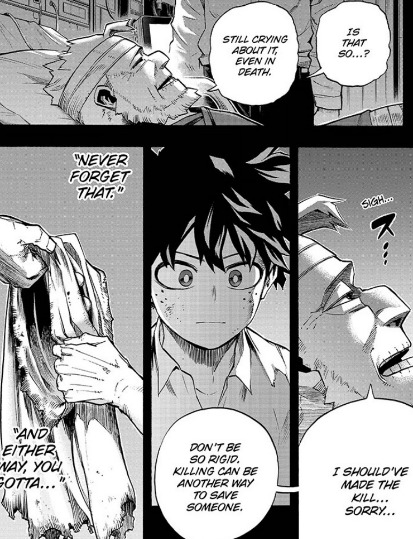
Now here’s the thing, if Deku hadn’t directly looked at the camera and told us he wanted to save Shgiaraki, would we be able to deduce his intentions from his actions? If you took away all of Deku’s internal monologue, and just showed him punching Muscular and saying nothing when Gran Torino says he may have no choice but to kill Shigaraki would anything about Deku’s actions indicate that he wants to save Shigaraki? Let me use avatar the last airbender as a positive example for a moment. People say that Aang’s desire to spare Ozai’s life comes out of left field, but like if you analyze Aang as a character down to their bending, and the way they react in situations they always prefer de-escalation, or taking a third option as opposed to confronting things head on. It’s literally why Toph says Aang has trouble learning earth bending, because as an airbender, he always tries to look for some other way to solve the problem, instead of a direct confrontation with force. As early as season one, Aang tells Zuko someone who has tried to kill him several times that he was friends with someone from the fire nation one hundred years ago and in a different situation they could be friends. Aang’s desire to save the Firelord may not have been told to us until the last possible minute, but Aang’s aversion to violence has always been a part of his character from the beginning. However, Deku never shows any similar aversion to violence. There’s basically no example where he ever tries to de-escalate a situation, or he avoids a conflict by seeking a third option.
Anyway, let’s move onto the next example. In the confrontation where Lady Nagant fights Deku, when Deku learns the fact that the heroes were employing government hitmen to attack people for uhh… exercising free speech does Deku give any reaction to this information? When Lady Nagant says that Deku is only going to bring back the status quo, does he show her any meaningful evidence that he won’t do that.
Deku’s response is because the world is so grey, he needs to extend a helping hand to others. Which you know what thay could be a response. Deku saying that his response to the corruption of the hero world is that he now understands that society led some people down the wrong path, so his way of addressing the wrongs of that society is lending a helping hand to as many people as possible even people he used to think was irredeemable.
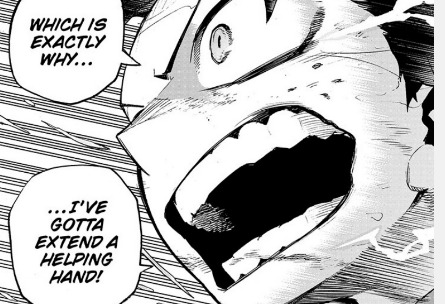
I will give Deku the benefit of the doubt, I think this is an acceptable answer. I can’t save everyone, but that’s not going to stop me from trying to save as many people as possible and maybe I can save people who were this society’s victims on the way too. However, does Deku demonstrate his resolve to extend a helping hand in any meaningful way.
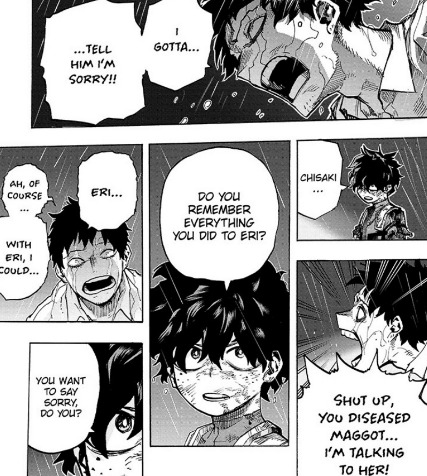
Deku is met with an armless, insane Overhaul who’s begging for someone to help heal his father figure in the Yakuza from his coma. This isn’t like Muscular who insists that there’s no helping him, Deku is met face by face with someone asking him for help. Deku’s gotta extend a helping arm whenever he can, because he knows some people were abandoned and led astray by this society… Unless that person is someone he doesn’t like personally. At which point he only helps them on a conditional basis. We are told Deku will save anyone and everyone, but Deku is met face to face with an armless man who is begging for help and Deku’s does nothing to help him. Deku’s not criticized for refusing to help overhaul either, it’s never brought up again. When Deku begins to experience a mental breakdown because of all the people he’s trying to help in the Dark Deku arc, we are told this is the result of Deku trying to save everyone, but we do not see Deku attempting to save a single villain after Muscular and Nagant.
He exhausts himself beating up villains that AFO sends after him, and only helping innocent civilians. Which would be fine if this arc were about how Deku is running away from his real responsibilities the same way that Judai was running, but that’s not what we’re being told. We are told that this is all part of an arc of Deku learning to understand villains and be a hero.
Deku is asked “Can you save Shigaraki?” by the story, but Deku never at any point has to deliberate on that question. Judai doesn’t deliberate on that question either, but him choosing not to think about things and stay ignorant is the point.
It’s actually fine to make Deku stagnate as a character. It’s fine to have him take the easy way out by just punching villains and giving up on them after one conversation. It’s fine for him to be empathetic to other people’s suffering, or even self-righteous. It’s fine for him to be ignorant.
He could be all of those things if it was a part of a narrative teaching him to unlearn his behavior. In fact the narrative might have been better if Deku started out by saying he didn’t want to save Shigaraki, that there was no choice but to kill him, because then at least his actions would be consistent with his words. Then his lack of empathy and his tendency to resort to violently beating up villains instead of avoiding violence would be character flaws he could work on. Deku however, is presented to us as this empathic hero who is always willing to give others a second chance though he never actually sticks his neck out in order to do so. Continuing on with our slow crawl through MHA, one of Deku’s friends is revealed as the traitor. Deku has a heartwarming scene fo saying that Aoyama can still be a hero, but look at his actions. He lets the adults in the room physically tie Aoyama in a straightjacket and imprison him, for the crime of… doing bad things while he was in a hostage situation. Apparently, if a bank teller helps the bank robber by giving them money when the robber has a gun to his head, the swat team should just snipe the bank teller. Not only does he not defend Aoyama against the adults, or stand up for him, or tell the adults they’re wrong to treat Aoyama a clear cut victim who had a gun to his head and was bing held hostage like he’s a villain - he also lets the adults use Aoyama an innocent victim as bait in order to lure out AFO. Deku tells Aoyama he can still be a hero, but he doesn’t defend Aoyama as a victim of being taken hostage, nor does he stop the adults from further taking advantage of him and throwing him right into danger. Some people are just led the wrong way that’s why they need to be extended a helping hand, but fuck Aoyama I guess. He needs to earn the right to be sympathized with by physically putting his life in danger.
Deku can’t even go out of his way to save a friend who he’s known for the better part of a year, when that friend is a complex victim forced to do bad things.
Then Deku and Uraraka have a conversation where they both, kind of ruminate on the idea that maybe the villains are human beings who are worthy of sympathy.
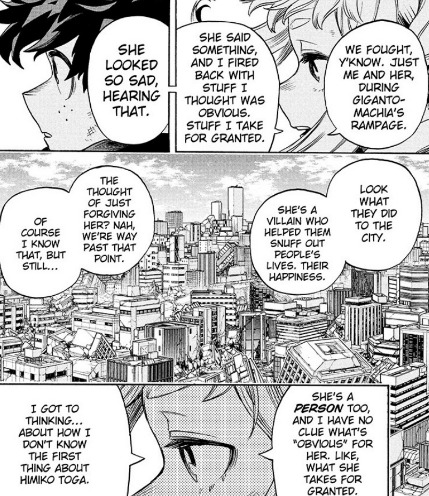
In fact Uraraka is actively trying to dehumanize Toga by looking at the destroyed city, so she won't have to think of Togaas a person.
The language here is also a major fault of this arc. It focuses far too hard on “forgiveness” over and over again. As I said before, saving Shigaraki isn’t about Shigaraki at all, it’s about Deku, and how he wants to use his power as a hero. Deku has even stated himself that he doesn’t believe that OFA is a power that should be used for killing people. So why does whether Toga or Shigaraki are forgivable or not even matter? It’s the same with Deku refusing Overhaul any sympathy. If he’s so morally opposed to abusers, then why does he work with Endeavor and defend him at every visible opportunity, even in front of his victims? Whether or not Deku can forgive Shigaraki doesn’t matter, because Deku is not the moral arbitrator or right and wrong. In fact Deku doesn’t even have any morals, so how is this a moral debate? Is there any point where Deku gives a clear definition of what he thinks right and wrong is? Does he quot Immanuel Kant to the audience?
Batman doesn’t kill people, not because he thinks that every last person on earth can be saved, but because Bruce Wayne an incredibly rich white man thinks that maybe he shouldn’t have the authority to decide who lives and who dies. When Bruce doesn’t kill the joker, it doesn’t mean he thinks the Jokers actions are forgivable, it’s because Bruce thinks it’s not his place to determine whether someone has the right to live.
The whole conflict that MHA presents us is that heroes pick and choose who to save, and only save the ones they deem as innocent. So, how does Deku saying repeatedly they can’t forgive Shigaraki contribute to that theme in any way? In fact by focusing on forgiveness, rather than whether or not he personally has the right to pick and choose who lives and who dies Deku is ignoring the elephant in the room. The question isn’t about whether Shigaraki’s redeemable or if his deeds should ever be forgiven. The question is whether Deku has the right to decide who gets saved and who doesn’t.
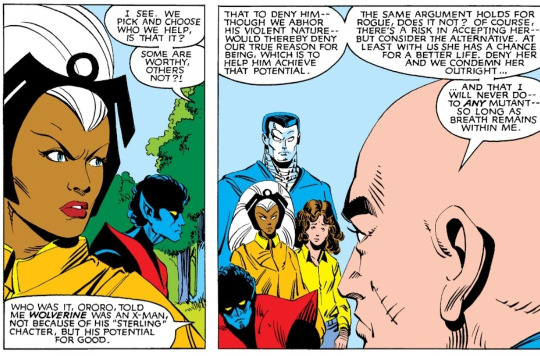
We are told that Deku as a character is someone who wants to save everyone no matter what, so Deku shouldn’t be focusing on whether or not Shigaraki is worthy of forgiveness, he should be making an idealistic argument like Xavier does in this panel. Why doesn’t Deku talk out loud with Uraraka on how he believes his power is for saving others, and not killing? If he’s meant to represent some idealistic hero, then why doesn’t he even talk about his ideals? Why don’t I as the reader know what those ideals are?
I think Xavier’s ideals of forcing the X-men to provide a good example to the mutant community, in order to try to earn the respect of other human beings is wrong, but at least he has ideals. He tries to inspire the other people around him to live up to those ideals. The story can criticize him for his ideals and point out how they’re wrong, while it can also uplift parts of his idelogy like where he believes there are no evil mutants. Deku has a chance to do the same to Uraraka, to tell her clearly, “I don’t think we as heroes have the right to pick and choose who we help…?” but he waffles. Not only does he waffle, but this moment is meant to be read as an indication that both Deku and Uraraka are sympathetic individuals who want to save their villains. They are supposed to look good and idealistic here and they don’t. For Deku it just seems like a repeat of his behavior with Overhaul. The only villains that are worthy of sympathy, are the ones that he personally decides are forgivable.
The story isn’t about whether or not it’s moral to save someone who’s killed as many as Shigaraki has. The story never seriously discusses any sort of complex morality or moral philosophy. Once again to bring up avatar, yes you can argue Aang sparing the life of a war crimminal is bad, but Aang mentions on multiple occasions that he wants to retain the cultural values of the airbending people. Aang has a morality, a consistent morality, it might not be a morality you personally agree with but at least he has one. Deku hates abusers, unless he’s next to Endeavor then he thinks abusers should be given the chance to atone. Deku doesn’t believe that One for All is a power for killing, but he never stands up to any of the adults who are blatantly trying to kill Shigaraki, he doesn’t even express out loud to Uraraka that he doesn’t think heroes have the right to decide who lives and who dies. In fact he’s given the perfect opportunity to, when Hawks kills a villain and it’s broadcast live on the news in font of everyone, but Deku never has anything to say about that. The reason Deku and Uraraka both put such an emphasis on “forgiving” their villains has nothing to do with the story itself. It’s because the author Horikoshi, is afraid that some people will misinterpret his story as saying that he actually thinks that saving a villain like Shigaraki means that he condones mass murder, so he has to have the characters talk about not forgiving Shigaraki.
Judai doesn’t have any consistent morals either, but once again that’s the point and something the story relentlessly calls him out on.
Cobra: Fortune would never smile on a fool like you who fights while prattling on about enjoying duels. Cobra: You are certainly a talented duelist. But you have one fatal flaw. Judai: A fatal flaw? Cobra: Yes, your duels are superficial. Someone who fights with nothing on his shoulders, cannot recover once he loses his enjoyment. What a duelist carries on his shoulders will become the power that supports him when he's up against the wall! Cobra: But you have nothing like that! Those who go through life without anything like that cannot possibly seize victory. Cobra: But I know that nothing I say will resonate with you... because you have nothing to lose but the match. Judai: I... Cobra: Afraid aren't you? Right now, you have nothing to support you.
Judai’s regularly called out for his superficiality. Judai is only a hero because he’s strong and wins fight, he doesn’t feel any responsibility towards other people, and in fact he loathes having to feel responsible for others. Judai isn’t just naive, he deliberately chooses to remain ignorant. Since he’s ignorant of his own faults, he makes awful decisions when it comes time for him to lead, and his friends die because of choices he made. We are told that Deku doesn’t want to remain ignorant, that he wants to understand villains, but Deku’s actual actions are him continuing to ignore society’s ills and the suffering of victims. In fact if you take away Deku’s internal monologue and the narration, Deku’s actions almost exactly mirror Judai’s.
Deku is just as superficial as Judai, and he also doesn't want to spend any time thinking about what kind of hero he wants to be, but the narrative never punishes him for it.
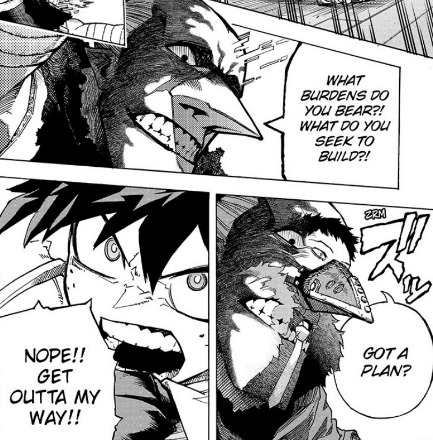
Judai is asked what burdens he has to bear and he has to meaningfull answer that question, Deku is allowed to get away with not having to think about anything. Deku remains superficial. Both Judai and Deku spend the entire arc running away from their villain rather than confronting them in any meaningful way. They both never express out loud any sympathy for their villain, or try to empathize. THey both never step down from the role of hero, and only confront their villain as a hero, because they don’t want to think about themselves as complicit or in the wrong. Shigaraki and Deku’s final confrontation mirrors Judai and Yubel’s but without the same clear framing. THe entire time Yubel is trying to get Judai to empathize with them, and Judai only responds with physical violence, because they don’t want to stop being the hero and because they can’t see Yubel as anything other than the villain. As soon as Deku arrives on the battlefield (by the way everyone else and their mom pointed this out, but Deku who doesn’t think OFA is a power for killing, is completely okay with a plan called the “Sky coffin plan” where every other hero was clearly trying to murder Shigaraki).
When Deku arrives he asks if Shigaraki is still in there, but he doesn’t do anything to try to reach Shigaraki, he jumps right to punching him. In fact he never tries anything besides punching him as hard as possible. How is punching Shigaraki with the force of a thousand suns saving him exactly? How is that different from how he tried to defeat Shigaraki the last war arc, before he saw the image of the crying child that made him want to try a different approach in saving Shigaraki? In Judai’s final fight with Yubel, it’s made explicitly clear that Judai is not trying to save Yubel, and that’s a fault on his part. In fact Judai gives the traditional “I have friends, and you don’t” speech to Yubel but it’s a subversion of how that speech is usually used. Usually that speech is used to show that the protagonist won because of they valued friendship,while the villain treated their friends poorly and only cared about power. However, it’s ironic in this case because Judai got all of his friends killed. Judai treats his friends like garbage. This speech isn’t used to show that Judai is winning because he values his friends more than Yubel does, it shows that Judai is a hypocrite, playing the hero in this situation where they are just as bad as Yubel. Judai’s not morally superior, he’s just lucky that he has good friends. Friends that were willing to save him. The only connection Yubel has to anyone else, Yubel’s only friend is Judai and Judai is a shit friend.
In fact, Mirio tries to give a version of the “You don’t have any friends” speech to Shigarkai, only for Shigaraki to get mad and tell Mirio that he does have friends and people he wants to protect.
This fact is also something that is blatantly ignored by Deku, even though Mirio tells him about it… even though we are told that Deku is trying his best to see the humanity in Shigaraki.
Judai blatantly admits they’re trying to kill Yubel. Which makes them a worse person, but a better character than Deku, because their actions are clearly framed by the narrative and consistent.
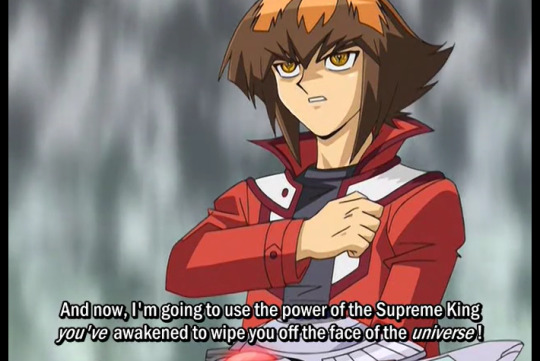
On the other hand we are told that Deku doesn’t want to kill Shigaraki, and yet everything Deku does makes it look like he’s just trying to kill Shigaraki and put him out of its misery. If we didn’t have Deku stating out loud that he wants to save Shigaraki and wants to see him as a human, there’d be nothing in his actions to indicate that he’s trying to avoid killing Shigaraki. Deku says he can’t pretend he didn’t see Shigaraki crying, but like, does he ever hesitate to punch Shigaraki, does he ever think that causing Shigaraki more harm is wrong when he’s already suffered so much? Deku says that Shigaraki is a person but does he treat him like a person? Does he try to talk to him like a person? To use avatar again, Aang does talk to Zuko pretty early on. Deku doesn’t even give the classic “We could have been friends under different circumstances” speech. When Shigaraki resists Deku’s attempts to see him as a person or emapthize with him, Deku’s response is to just resort to punching harder.
Which is in effect the same thing Judai does to Yubel, just kill them as a villain so they don’t hurt anybody else, but framed in an entirely different light. Judai is shown to be ruthless, and cold in his attempt to only settle the conflict with Yubel by violently putting them down. On the other hand we’re being told that Deku is compassionate and empathic while he punches Shigaraki with the force of a thousand suns.
There’s another eerie similarity between both of these final confrontations. At the climax of the confrontation, both Judai and Deku have a psychic vision where they see events from Yubel and Shigaraki’s childhood. This vision is supposed to help both characters understand the good in the villain they’re facing.
Let’s see the contents of this vision and how the visions change each character. Judai is shown a vision of his past life where Yubel sacrifices their entire body, and even their humanity to go through painful surgery to turn into an ugly dragon, all for the sake of protecting Judai in a previous life.
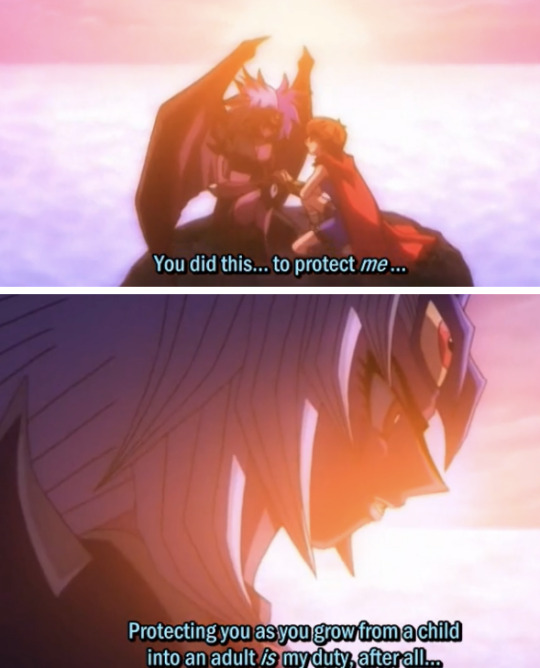
Judai is then forced to witness the good side of Yubel they’ve been ignoring all along to paint them as a villain. Yubel is simultaneously extremely selfish and willing to hurt people Judai cares about, but they’re also extremely selfless and will do anything to protect Judai and have made great sacrifices in the past for Judai’s sake. Deku gives lip service to not ignoring the humanity in Shigaraki, but Judai is literally forced to acknowledge the humanity in Yubel. Not only that, but Judai changes his behavior immediately after learning this new information. After seing the sacrifice that Yubel made for him in the past, Judai responds with a sacrifice of his own. A sacrifice that perfectly mirrors the sacrifice that Yubel once made for him. Yubel gave up their humanity for Judai, so Judai fuses his spirit to Yubel’s, becoming a human / spirit hybrid so Yubel no longer has to be alone.
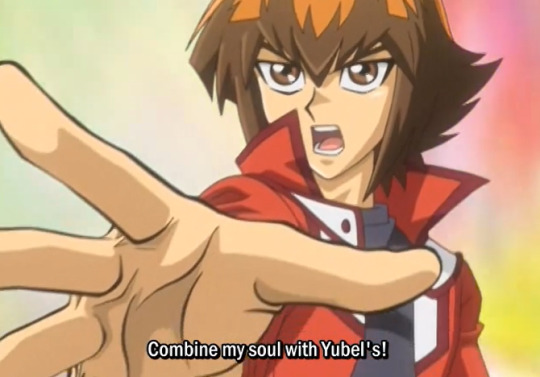
Judai also doesn’t just fuse their soul with Yubel’s in order to stop Yubel from destroying everything, it’s because both of them at this point need to atone together, and Judai is fulfilling his responsibility of watching over his friend until the end to prove that you care about them - as he said to Sho. Judai’s also fulfilling Johan’s dream of helping repair the bonds between spirits and humans, by reconciling with Yubel and repairing their bond. It’s also Judai atoning for his previous behavior of abandoning Yubel, by choosing to stay alongside them as they both atone together. Deku does sacrifice OFA during the fight against Shigaraki, but their sacrifice isn’t to help Shigaraki, but rather doing psychic damage to Shigaraki by using OFA is the only way to defeat them. He transfers OFA in order to break Shigaraki’s brain so he’ll stop reissting and Deku can beat him down. Judai fuses their soul together with Yubel out of empathy and a responsibility they feel to help their friend fater abandoning them, Deku transfers One for All to Shigaraki in order to hurt him and make him easier to punch. It's funny that Deku doesn't travel to Shigaraki's mind to learn more about him, but instead with the specific intent of harming him.
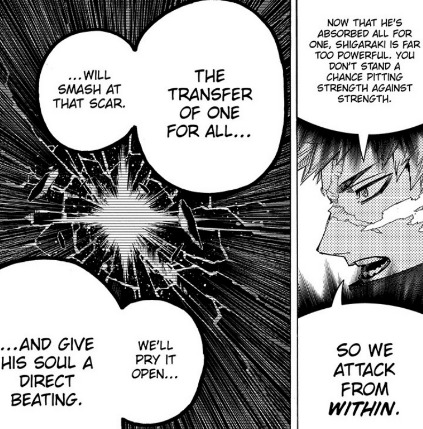
Once he's inside Shigaraki's mind, he doesn't take time to reflect on how Shigaraki used to stand up for bullied kids, or how he wants to be a hero to villains because no one else will stick up for the outcasts in society. No, he only care about Shigaraki when he takes the form of a child crying for help.
In the aftermath of the psychic vision Deku’s behavior doesn’t change towards Shigaraki in any way either. You could say he sacrificed his own arms in order to try to comfort Shigaraki within the depths of his own mind - but that’s not a real sacrifice either because his arms immediately come back. When Judai learns about the sacrifice that Yubel made in a previous life towards him, he stops seeing Yubel as an enemy and finds a way to resolve things peacefully between them. When Deku lanterns that Shigaraki’s a victim of All for One, and that his entire life was a lie, when he sees Shigaraki’s suffering first hand does his beavior twoards Shigaraki change in any way?
When he sees Afo has taken over Shigaraki’s body again, does he try to shout for Shigaraki, to tell Shigaraki to fight from the inside, to reassure Shigaraki that he’s still in there that there’s still good in him? Nope. He just punches Shigaraki some more.
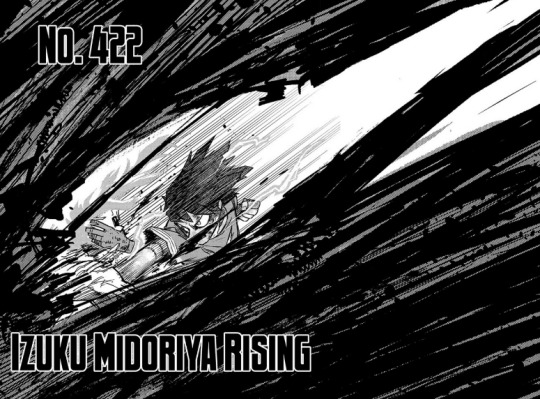
What Deku needed to tell Shigaraki is so obviously set up by the narrative too. Shigaraki wanted just one person in that house to tell him he could be a hero. Deku wanted his mother to tell him he could be a hero if he was quirkless. Deku sees that Shigaraki started out as a boy who wanted to be a hero, and who was manipulated into being a villain but does he try to appeal to the boy inside of Shigaraki by telling him he can still be a hero? Does he now see the good in Shigaraki? Nope, he just tries to kill him by punching him really hard.
I purposefully chose the images for the banner of this post, because it shows how differently MHA and GX treated its villains in the end. Yubel is embraced by Judai in the end, Shigaraki evaporates into dust.
"Judai, now that our souls have become one we will never be separated again. I have now been filled with your love and power. Let us fight together, against the wave of light leading this universe to destruction!"
Shigaraki could so easily have been given the love and empathy that Yubel was shown, but instead their life ends with no show of empathy from Deku, and with them dying believing that their long life of tragedy meant nothing in the end. Shigaraki realizes he's a crying kid, but he's never comforted.
Shigaraki: I only stole my body back from Master, and I didn't destroy anything. "In the end, I was just as you said... A crying kid, huh?"
Yubel is embraced and comforted, Shigaraki disintegrates into nothing.
One of these stories is apparently an optimistic story about heroes saving people, but it ends with the lifelong victim being killed in the most nihilistic manner possible, never receiving comfort, and never achieving anything with his long life.
The other story is a silly anime about card games, shows that when people are alone and suffering they can lash out and do terrible things. That all people are weak especially when they're alone, but the solution isn't to abandon them, or condemn them for their faults, but to believe in them and help uplift them the same way that Judai decides to uplift Yubel so they can atone together.
Which is why Deku gets an F in being a hero. Go directly to summer school. Do not pass Go. Do not collect $100.
#mha meta#ygo meta#mha 423#bnha 423#mha 423 spoilers#bnha 423 spoilers#izuku midoriya#deku#shigaraki tomura#tenko shimura#judai yuki#yubel#soulshipping#yu gi oh gx#yu gi oh
707 notes
·
View notes
Text
it's a story about hands (reprise)
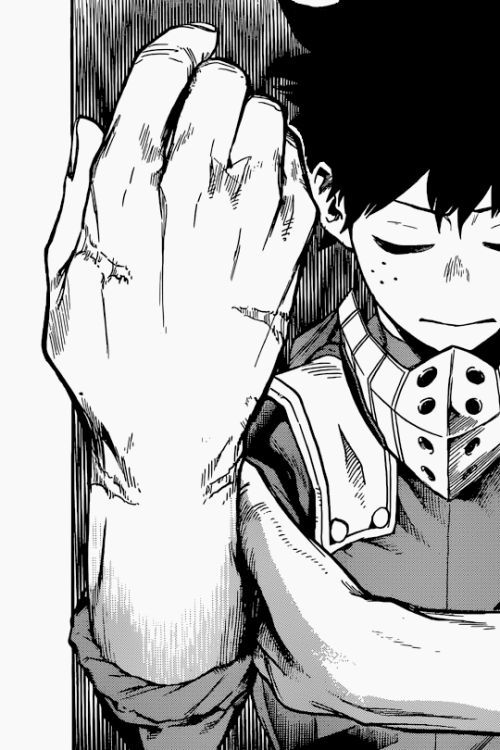
Yeah, okay, today's the day.
I gave my blog that title for a reason, you know, and it has loomed over me for years because the hand motif is absolutely everywhere and you could go on about it forever.
Maybe that's something I'll never actually attempt to do, but this chapter, we reached a breaking point.
Before I continue, I need to give a big, big disclaimer: I do not have a physical disability, so I'm not able to speak about that from the standpoint of representation as a first-hand perspective. I have at least listened to enough disabled people to know that fictional characters who become amputees only to miraculously gain their limbs back is, um, a trope. Disabled people in general being "healed" is a conception we would really prefer to avoid here. Not to call people out, but I don't think we're giving enough space to acknowledge that.
I don’t feel comfortable making the judgement call about what should happen. I’m leaving that open. I also don't want to downplay people's emotional reactions. Honestly, I don't know if I can accurately define the line between acknowledging real pain vs. ableist pity. But I’d like to talk about the possibilities of what could happen. Other characters have definitely gotten permanent disabilities as a result of their hero work, or even just the side effects of their quirk. But, for better or worse, I don't think this case is really about representation. Not that Horikoshi won't do that justice. He might. What I'm saying is that's not his purpose for having Izuku lose his arms. It's meant to be symbolic, so we can explore what it means. The other thing I’m keeping in mind here is that Horikoshi is notorious for playing with our expectations, like, alllllll the time. I mean, just take a few chapters ago for a classic example. Eri appeared at the end, and we all assumed she was about to take some sort of action to save someone with her quirk. Then, immediately following, we were given an explanation for why that wouldn’t be happening. And now it’s clear he wanted to do that “fake out” not just as a silly cliffhanger prank, but specifically so we would know not to suspect that Eri could be the miraculous solution to Izuku’s loss of his arms. Rest assured, there is no easy way out of this.
The expectation at play in this particular instance is an old one. It’s very understated, but its subtext has burned so brightly, you’d be a fool not to notice it. It sits with anticipation like one half of a call and response. Man, I was so certain. Lots of people still are. I was really looking forward to printing the panel where it happened onto a t shirt and wearing it proudly. All the hand motifs in this story radiate thematically from a single moment, the one that started it all for Izuku.
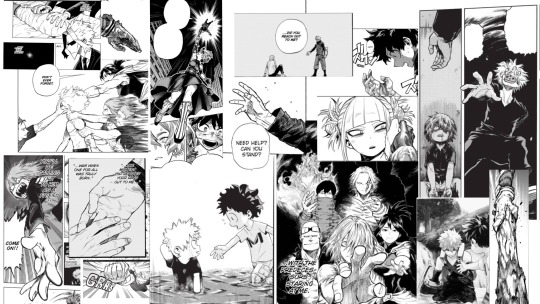
It raises all kinds of questions about the act of saving, who needs saving, why, what does it mean, what are the dynamics of power, politics, honesty, exploitation, compassion, pity, disdain, sacrifice. Katsuki has dealt with many of these since he first rejected Izuku’s hand. While Izuku was the one who was convinced Katsuki would keep on rejecting him…
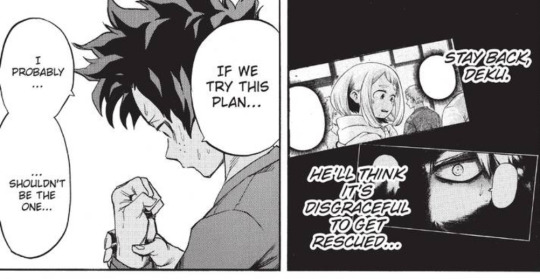
…Katsuki was the one who kept that moment in his mind all these years and eventually came to regret it.
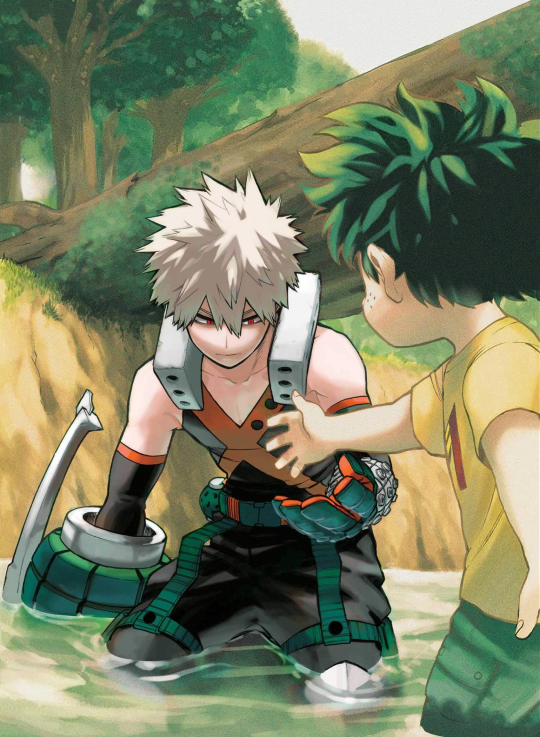
Katsuki is the one yearning for that hand-hold, the one who has imbued it with so much more weight than it ever originally had. Izuku, in contrast, does not allow himself to dwell on what he wants. To illustrate this difference, we need to look at another piece of foreshadowing:
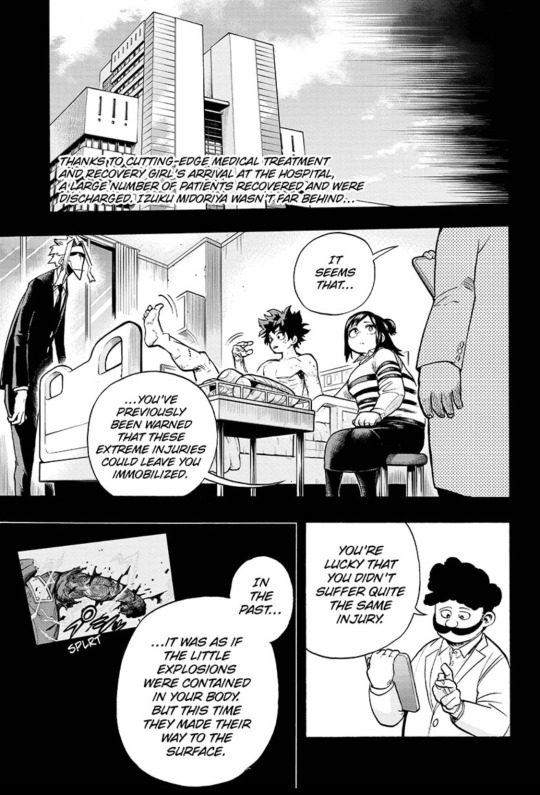
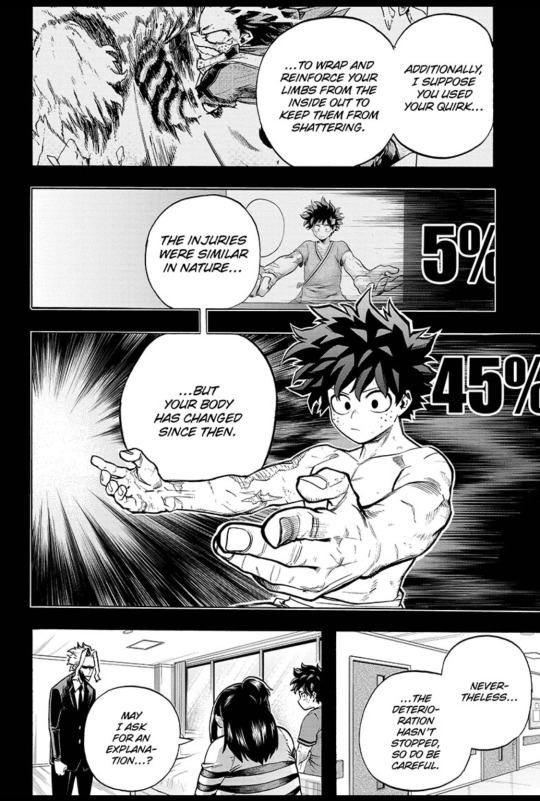
Ugh, do y'all remember when lots of folks were complaining about how there never seemed to be actual consequences for Izuku's destructive treatment of his own body? I don't blame them, I was concerned and confused about it too. There were several "fixes" along the way. Recovery Girl healed him, but left a physical reminder. Then he started training to fight with his legs… sometimes. Then he got support items. All of these were unsatisfying non-conclusions because they didn't present Izuku with a lasting enough impression to change in a meaningful way. They didn't address his core, his origin.
Of course, that all changed this chapter. Now it looks like our frustration was inflicted intentionally. With the current context in mind, all of these moments look more sinister, like this day was always gonna come because they kept putting bandaids on a deep emotional and psychological wound. The problem is pretty much spelled out for us here:
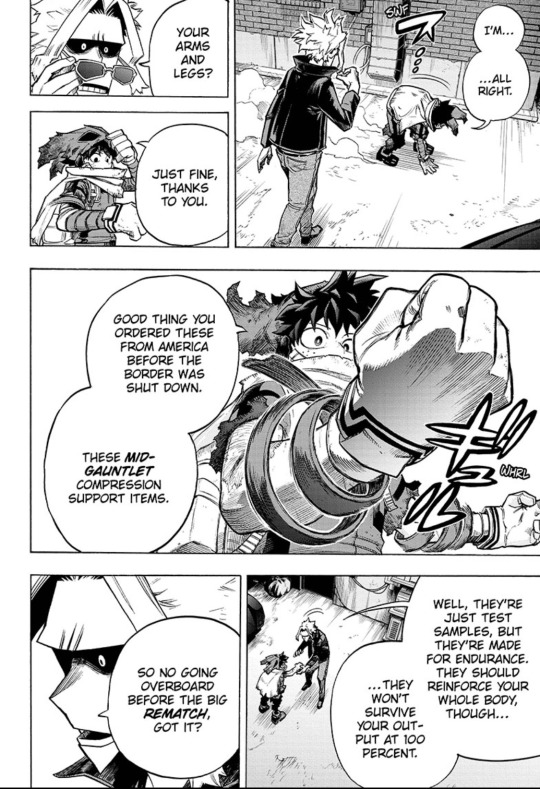

As Katsuki put it, he just doesn’t take himself into account, ya know? He doesn’t care what happens to him. And he lies about it, to keep others from worrying, to keep them safe. To keep them from returning the favor and putting themselves in harm’s way for his sake. His motivations are noble,
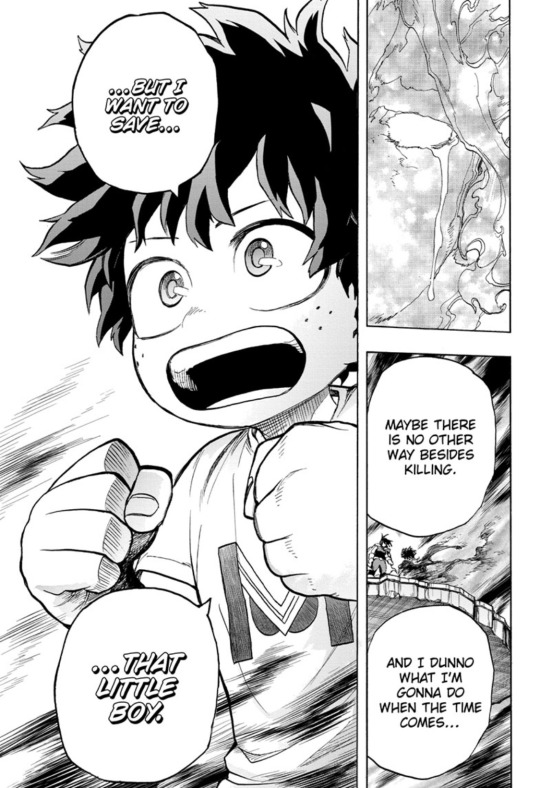
…but what about the little boy inside Izuku? Who saves him?
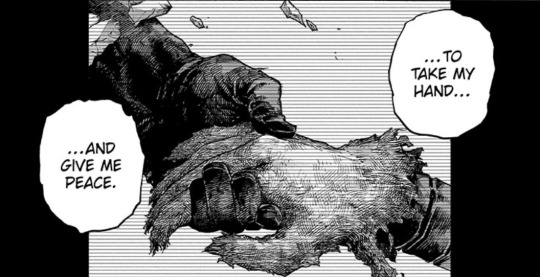
This is all about Izuku giving himself up to the point that he literally has no more to give. The thing is, I bet he saw this coming. He knew his limits and decided to keep going anyway, because his personal safety and wellbeing are not important. Now that way of thinking has come back to bite him because the fight isn’t over yet, and he’s already made his sacrifice. So now we know who will be more distraught over this. Not Izuku—Katsuki.
It’s not about Izuku becoming disabled, it’s about how Katsuki wanted to use the intertwining of their fingers to communicate that he would never let go. Never stop valuing him most. Never let himself make the mistake of rejecting him again. Never let Izuku be so reckless with his life. To say: “we are in this together.”…if only Katsuki believed he deserved to be able to say such things. To reach out his hand would have been the ultimate way to simply imply them and let Izuku be the one to decide. Then, to feel their hands clasped together would be more than either of them dared hope for, but so beautiful, so right. A moment they’ve waited their whole lives for.
Yeah. That’s what we were expecting. We’ve been so comfortable. Horikoshi gave us all the signs. He tempted and teased us over and over. BUT. You know he does this thing were he gives us a desirable, completely plausible and simple thing to look forward to, and then he snatches it away. And THEN he replaces it with something much better, something we were not expecting at all because it seemed too good to be true. That’s exactly what happened when Himiko snatched Izuku away, and we were robbed of the chance to see him and Katsuki fight together. In hindsight, though, I’m glad things went a different way because now there’s so much more depth and angst on display. Likewise, in the present moment, we may consider how, as one door closes, another opens.
As wonderfully meaningful as the hand-hold would have been, perhaps it is still too simple a resolution for Izuku, for his and Katsuki’s relationship. Tbh, it could have been done like 100 chapter ago. At this point, there’s so much more potential. There are a couple of ways it could go. If Izuku stays armless, Katsuki will be forced to use other methods to get his point across. He’ll have to do something else, or say what he means, or both. Yes, I’m talking about what you think I’m talking about. If I say it, I just might jinx it (lol), but I mean it. I’m being serious. Either way, if Izuku did get his arms back in the end, I’m sure that it wouldn’t be an easy fix. It would be hard-won against Izuku’s self-destructive mindset, and/or by Katsuki’s conviction. Again, I say this knowing it is not meant so much as a representation of disability, but as a representation of Izuku’s greatest character flaw taken to the extreme. I know this might sound harsh, like, hasn’t he been through enough? I get that, but… I’ve said it before and I say it again: Izuku is stubborn as hell.
I wish I had a resounding final note to end this on, but I kinda don’t. I’m not sure what’s best. Now we just have to wait and see what Horikoshi has in mind.
#lin speaks#bnha meta#bnha manga#bnha 419#mha#boku no hero academia#my hero academia#midoriya izuku#bakugou katsuki#bakudeku#bkdk#dekubaku#dkbk
414 notes
·
View notes
Text
The making of painted stones

Well, a few times I was asked to show the process of miniature paintings on stones, and here is my first attempt to capture and explain it. Warning - I only have my phone's camera at my disposal, so the quality is not very good.
Firstly - an idea for the image. Every stone has something in its pattern that can be a starting point for developing an imagery. The stone I picked for this one is a beautiful Picasso jasper, and in this case I was looking for a stone for a specific idea I've already had in mind. Spontaneous improvisation dictated by the stone's pattern is also great but I decided to pick something more definitive for better illustrating the process.

This jasper's pattern already has outlines that can be developed into a landscape without painting it over too much. I don't like it when stones are just mindlessly covered by slapping a random image on it, ignoring the colours, textures and patterns.
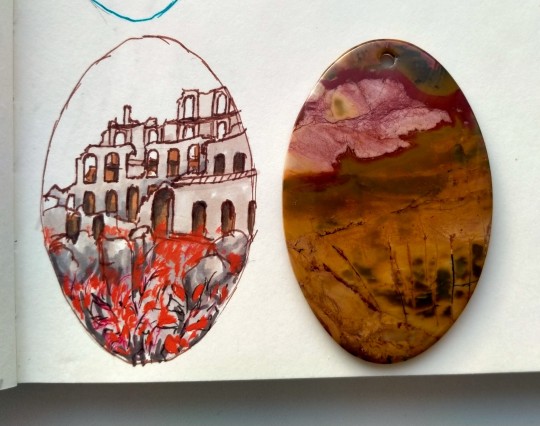
Here's the idea - ruins of an amphitheatre overgrown with red gladioluses. I know, I know, but I'm very interested in the initial mystical sacrificial background of gladiators. So here it is, arena covered in red, swords in the sand, but it's finally quiet.
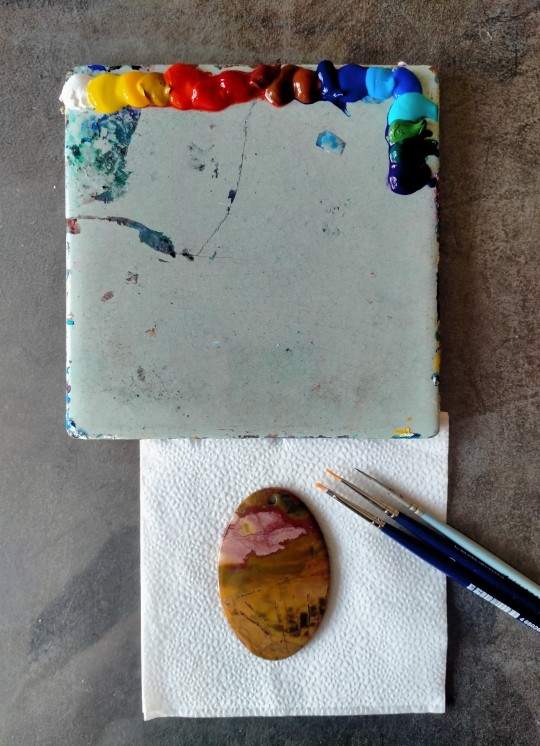
Before we start, a stone must be varnished - minerals are porous, and lacquer smoothes its surface. I paint with tempera - most artists who work in lacquer miniatures use oils, but tempera allows quicker process, which is important for me. I'm autistic and my executive dysfunction makes working with oils difficult - my sudden bursts of activity won't match with drying timings and such. So, tempera for me.

Starting with sketching the outlines of the ruins and painting our light source, the sun and red clouds. I'm trying to work with a palette that the stone already has and make the painting as harmonious as possible.
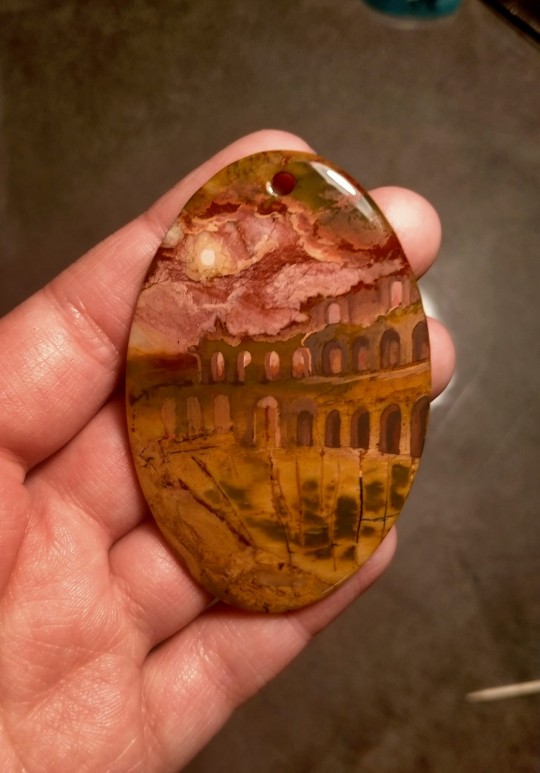
Erasing auxiliary lines as we continue.

Done with the first layer - the walls and the sky. After the paint dries, I apply varnish (I use Novol clearcoat, car varnish - it's very durable). There can be as many layers as you need.
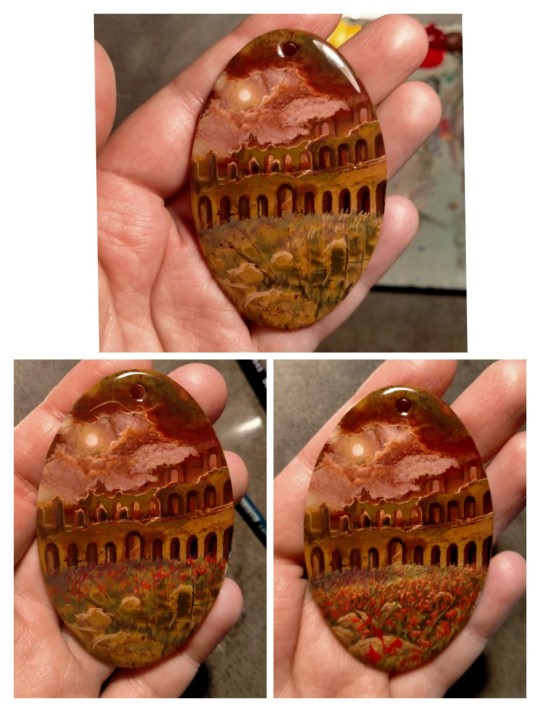
Now - the flowers and details.
After the painting is finished, it'll need several layers of varnish. And some fine sandpaper (1500) in-between the finishing layers for better grip.
And here it is! time to think abou a necklace for this one.
I'm not sure how useful I can be and what aspects you would like to know, so feel free to ask. I'm not sure I can make a good enough video with my current phone, so this'll have to wait. I tried to skip all the musings about ideas and finding stories, but whatever. And the time needed for work - I don't know. There was a month-long pause in the making of this one, due to a couple of emergencies that knocked me down for some time, and it's not easy for me in general due to my mental state - sometimes I can make a painting in two days, sometimes it takes years, nothing is certain with me, especially now. But well, here's what I do.
#miniature#painted stones#rock painting#painted rocks#minerals#picasso jasper#jasper#amphitheatre#arena#gladiators#gladiolus#gladioluses#flowers#ruins#roman ruins#ancient rome#sky#my art
855 notes
·
View notes
Note
Hi! Just wanted to ask. How can I give my students assignments that are chat-gpt proof? Or that they won't just copy the answer without at least doing some editing?
Hi! So, I don't think anything is ChatGPT-proof. You fundamentally cannot stop people from using it to take a shortcut. You can't even stop them from copying the answer without editing it. However, I think you can work with this reality. So, you can do three things:
Don't be a cop about it.
If you make your objective "stop the children from using the thing to cheat," you are focusing on the wrong thing. You will be constantly scrutinizing every submission with suspicion, you will be accusing people of cheating--and some of them will not have cheated, and they will remember this forever--and you will be aiming at enforcement (which is trying to hold back the sea) instead of on inviting and supporting learning whenever and wherever possible. (I'll come back to this under item 2.)
Regarding why enforcement is holding back the sea: It is fundamentally rational for them to do this. We, who "love learning" (i.e. are good at what our academic system sees as learning, for various reasons have built our lives around that, happen to enjoy these activities), see everything they might cheat themselves of by doing it, because we know what we got out of doing this type of work. Many students, however--especially at the kind of school I teach at--are there to get the piece of paper that might, if they're lucky, allow them access to a relatively livable and stable income. The things that are wrong with this fact are structural and nothing to do with students' failings as people, or (tfuh) laziness, or whatever. We cannot make this not true (we can certainly try to push against it in certain ways, but that only goes so far). More pragmatically, chatgpt and similar are going to keep getting better, and detecting them is going to get harder, and your relationships with your students will be further and further damaged as you are forced to hound them more, suspect them more, falsely accuse more people, while also looking like an idiot because plenty of them will get away with it. A productive classroom requires trust. The trust goes both ways. Being a cop about this will destroy it in both directions.
So the first thing you have to do is really, truly accept that some of them are going to use it and you are not always going to know when they do. And when I say accept this, I mean you actually need to be ok with it. I find it helps to remember that the fact that a bot can produce writing to a standard that makes teachers worry means we have been teaching people to be shitty writers. I don't know that so much is lost if we devalue the 5-paragraph SAT essay and its brethren.
So the reason my policy is to say it's ok to use chatgpt or similar as long as you tell me so and give me some thinking about what you got from using it is that a) I am dropping the charade that we don't all know what's going on and thereby making it (pedagogical term) chill; b) I am modeling/suggesting that if you use it, it's a good idea to be critical about what it tells you (which I desperately want everyone to know in general, not just my students in a classroom); c) I am providing an invitation to learn from using chatgpt, rather than avoid learning by using it. Plenty of them won't take me up on that. That's fine (see item 3 below).
So ok, we have at least established the goal of coming at it from acceptance. Then what do you do at that point?
Think about what is unique to your class and your students and build assignments around that.
Assignments, of course, don't have to be simply "what did Author mean by Term" or "list the significant thingies." A prof I used to TA under gave students the option of interviewing a family member or friend about their experiences with public housing in the week we taught public housing. Someone I know who teaches a college biology class has an illustration-based assignment to draw in the artsier students who are in her class against their will. I used to have an extra-credit question that asked them to pick anything in the city that they thought might be some kind of clue about the past in that place, do some research about it, and tell me what they found out and how. (And that's how I learned how Canal St. got its name! Learning something you didn't know from a student's work is one of the greatest feelings there is.) One prompt I intend to use in this class will be something to the effect of, "Do you own anything--a t-shirt, a mug, a phone case--that has the outline of your city, state, or country on it? Why? How did you get it, and what does having this item with this symbol on it mean to you? Whether you personally have one or not, why do you think so many people own items like this?" (This is for political geography week, if anyone's wondering.)
These are all things that target students' personal interests and capabilities, the environments they live in, and their relationships within their communities. Chatgpt can fake that stuff, but not very well. My advisor intends to use prompts that refer directly to things he said in class or conversations that were had in class, rather than to a given reading, in hopes that that will also make it harder for chatgpt to fake well because it won't have the context. The more your class is designed around the specific institution you teach at and student body you serve, the easier that is to do. (Obviously, how possible that is is going to vary based on what you're teaching. When I taught Urban Studies using the city we all lived in as the example all through the semester, it was so easy to make everything very tailored to the students I had in that class that semester. That's not the same--or it doesn't work the same way--if you're teaching Shakespeare. But I know someone who performs monologues from the plays in class and has his students direct him and give him notes as a way of drawing them into the speech and its niceties of meaning. Chatgpt is never going to know what stage directions were given in that room. There are possibilities.) This is all, I guess, a long way of saying that you'll have a better time constructing assignments chatgpt will be bad at if you view your class as a particular situation, occurring only once (these people, this year), which is a situation that has the purpose of encouraging thought--rather than as an information-transfer mechanism. Of course information transfer happens, but that is not what I and my students are doing together here.
Now, they absolutely can plug this type of prompt into chatgpt. I've tried it myself. I asked it to give me a personal essay about the political geography prompt and a critical personal essay about the same thing. (I recommend doing this with your own prospective assignments! See what they'd get and whether it's something you'd grade highly. If it is, then change either the goal of the assignment or at least the prompt.) Both of them were decent if you are grading the miserable 5-paragraph essay. Both of them were garbage if you are looking for evidence of a person turning their attention for the first time to something they have taken for granted all their lives. Chatgpt has neither personality nor experiences, so it makes incredibly vague, general statements in the first person that are dull as dishwater and simply do not engage with what the prompt is really asking for. I already graded on "tell me what you think of this/how this relates to your life" in addition to "did you understand the reading," because what I care about is whether they're thinking. So students absolutely can and will plug that prompt into chatgpt and simply c/p the output. They just won't get high marks for it.
If they're fine with not getting high marks, then okay. For a lot of them this is an elective they're taking essentially at random to get that piece of paper; I'm not gonna knock the hustle, and (see item 1) I couldn't stop them if I wanted to. What I can do is try to make class time engaging, build relationships with them that make them feel good about telling me their thoughts, and present them with a variety of assignments that create opportunities for different strengths, points of interest, and ways into the material, in hopes of hooking as many different people in as many different ways as I can.
This brings me back to what I said about inviting learning. Because I have never yet in my life taught a course that was for people majoring in the subject, I long ago accepted that I cannot get everyone to engage with every concept, subject, or idea (or even most of them). All I can do is invite them to get interested in the thing at hand in every class, in every assignment, in every choice of reading, in every question I ask them. How frequently each person accepts these invitations (and which ones) is going to vary hugely. But I also accept that people often need to be invited more than once, and even if they don't want to go through the door I'm holding open for them right now, the fact that they were invited this time might make it more likely for them to go through it the next time it comes up, or the time after that. I'll never know what will come of all of these invitations, and that's great, actually. I don't want to make them care about everything I care about, or know everything I know. All I want is to offer them new ways to be curious.
Therefore: if they use chatgpt to refuse an invitation this week, fine. That would probably have happened anyway in a lot of cases even without chatgpt. But, just as before, I can snag some of those people's attention on one part of this module in class tomorrow. Some of them I'll get next time with a different type of assignment. Some of them I'll hook for a moment with a joke. I don't take the times that doesn't happen as failures. But the times that it does are all wins that are not diminished by the times it doesn't.
Actually try to think of ways to use chatgpt to promote learning.
I DREAM of the day I'm teaching something where it makes sense to have students edit an AI-written text. Editing is an incredible way to get better at writing. I could generate one in class and we could do it all together. I could give them a prompt, ask them to feed it into chatgpt, and ask them to turn in both what they got and some notes on how they think it could be better. I could give them a pretty traditional "In Text, Author says Thing. What did Author mean by that?" prompt, have them get an answer from chatgpt, and then ask them to fact-check it. Etc. All of these get them thinking about written communication and, incidentally, demonstrate the tool's limitations.
I'm sure there are and will be tons of much more creative ideas for how to incorporate chatgpt rather than fight it. (Once upon a time, the idea of letting students use calculators in math class was also scandalous to many teachers.) I have some geography-specific ideas for how to use image generation as well. When it comes specifically to teaching, I think it's a waste of time for us to be handwringing instead of applying ourselves to this question. I am well aware of the political and ethical problems with chatgpt, and that's something to discuss with, probably, more advanced students in a seminar setting. But we won't (per item 1) get very far simply insisting that Thing Bad and Thing Stupid. So how do we use it to invite learning? That's the question I'm interested in.
Finally, because tangential to your question: I think there's nothing wrong with bringing back more in-class writing and even oral exams (along with take-home assignments that appeal to strengths and interests other than expository writing as mentioned above). These assessments play to different strengths than written take-homes. For some students, that means they'll be harder or scarier; by the same token, for other students they'll be easier and more confidence-building. (Plus, "being able to think on your feet" is also a very good ~real-world skill~ to teach.) In the spirit of trying to offer as many ways in as possible, I think that kind of diversification in assignments is a perfectly good idea.
#teaching#chatgpt#posting this on my first teaching day of the semester!#this is probably a lot longer than what you asked for but it is the answer i know how to give. hope something in it helps!
1K notes
·
View notes
Text
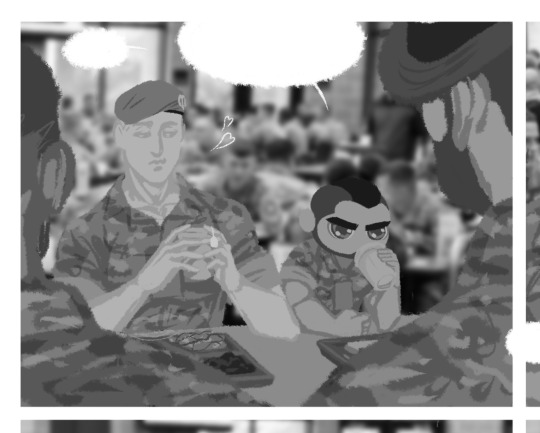
hey everyone!
a few news items right before we start up chapter 5. firstly i just wanna say thanks to everyone who follows my comics, it's been a pleasure as always. i've been keeping a longer buffer on patreon than usual, mostly for my mental health. publishing takes a lot of energy and i've really felt it necessary to just focus on production for a few weeks. at this point, patrons have seen most of chapter 5, there's only one more scene and about a page to be drawn. the quiet has been nice, i've caught up on a lot of house keeping, though i'm obviously very excited to present it! and on house keeping,
DOMESTICATED IS NOW LIVE AT IT'S NEW HOME!
to not go into the boring details (the old domain got trapped between to hosting sites in the middle of a buyout), it's not hosted at cod-domesticated.com (rip custom url you will be missed) it will instead be hosted at salemlinnet.com/domesticated (now you live at my house like you're my son why didn't i think of this sooner). if you find any errors in the pages i am so sorry i just formatted so many buttons TTuTT it would be super helpful to me if folks could report any specific buttons that don't work if it's convenient, it's been beta tested by the discord (thank you guys so much) but i'm just a dunce and i can't be trusted so there might be errors.
the simons are all wearing a little beret this chapter is my third point of business, i am losing it over the ghost beret. oh and the devil may care is up to chapter 18, will be chapter 19 within a few days. page 21 is out for patrons.
finally, to the people lurking for thistle and spade. i've wanted to say for some time, i'm really grateful that you've stuck around while i've been too sick to work on a bigger project. if you were here to see me start production for and then pull ghost #1, the story behind it is that i sort of suddenly learned i wouldn't always be as sick as i was, that i didn't have to rush anything, and that i could produce thistle and spade in chronological order with a bit of patience. that left me with no smaller project to draw and release in the mean time, except, see, i really like this game, call of duty. i was still on bed rest when i started domesticated, and with a ton of physical therapy i've been able to draw longer and longer hours. it's trained me up to be a better comic artist than i ever was before. it's grown into a sturdier project at the same pace. it's so unlike thistle and spade, whose chapters were written and edited over years and planned to every gesture and expression. i'm just winging it with domesticated, i'm usually rewriting massive swaths of dialogue as i sketch the scenes out, i just keep throwing out ideas until it's something i'm excited to draw and present as my imaginary "what happened outside of the games" day dream land. it's reminded me what i love so much about story telling and comics. it's made me excited to see thistle and spade go live again down the road. but first i have to rebuild its website too TTuTT
all right i'll see everyone pretty soon! thanks for hanging around as usual!
#simon ghost riley#soapghost#ghostsoap#john soap mactavish#call of duty#thistle and spade#kyle gaz garrick#captain price
169 notes
·
View notes
Note
As someone who only recently got properly into Magic this year my stance on the recent UB Standard legality is that so long as the mechanics are good, fun to play, and work well with the other Standard legal sets then I don't particularly care if Final Fantasy is legal.
But.
There is something about the Marvel Universe being Standard Legal that feels off. Final Fantasy shares many aesthetic and gameplay similarities to Magic that make it slide into the general ecosystem better from a Look/Feel perspective. Meanwhile, as much of a Spider-Man fan as I am, it is going to be incredibly weird seeing Peter Parker or Miles Morales face off against the critters of Bloomburrow, even more than Thunder Junction or Duskmourn do.
I will attend the Final Fantasy and Spider-Man prereleases because I love playing Magic and I am interested in both sets, but I cannot shake the feeling that this decision makes the overall play experience strange, especially since SIX Standard sets of a year is way overdoing it (maybe 3 In-Universe sets and 1 UB set would be a better balance?)
I understand the decision from a logical standpoint but the emotional reaction to Magic losing some of its Qualia is something that I can't ignore
I have read many of the responses to my request for emotional responses yesterday (I will continue reading - there are just a lot of people sharing). A common through line is the feeling of loss, that the decisions we’ve been making are taking things away from them.
So, I wanted to take a moment to talk about something that I believe Universes Beyond is adding to the game. I’m not talking about value to other people that aren’t you, but something that is upside to the enfranchised players that are the backbone of the game.
As I’m head designer, my focus is on mechanics and the core gameplay experience of playing the game. Universes Beyond has been a bolt of energy for the design of the game.
Because so many of you are sharing personal stories, I’ll use my own experiences as a way to illustrate my point.
One day, when I was seven or eight, I woke up and went downstairs to see that my Dad had bought me a comic book and left it out on the counter for me as a surprise. It was Spider-Man.
I must have read that comic ten times. It was the start of a life long love of comic books. I’m not quite sure why the superhero genre, in particular, spoke to me so strongly, but it did.
As a teenager I was a bit of an outcast, and when I stumbled upon the X-Men, it felt like a story that was core to my lived experience. I too was an outsider, but out there were people like me and if I could find those people, we could bond over our similarities.
I enjoy designing Magic. I mean really, really enjoy designing Magic. I don’t throw around the term “dream job” lightly. It is truly a lifelong passion. I spend so much time writing about it because it is something that brings me so much joy, and there is a desire to share that joy with others, my found family that shares my similarities.
Designing Marvel cards has been electrifying. I have spent years mastering the art of Magic design. Getting to combine that with my love of Marvel characters has been inspirational. It has inspired to make designs I would have never thought of.
It has pushed me in directions I couldn’t have predicted and resulted in designs that tickle both my inner Mel and Vorthoses.
And it hasn’t just affected my own designs. I have given more notes on card designs than I have in my twenty nine years at Wizards.
For example, the amount of back and forth with Aaron who designed the five Secret Lair cards we recently revealed at New York ComicCon was exhaustive. He and I have long bonded over our shared love of Marvel, so getting to translate that into Magic with him has been amazing.
And each Universes Beyond product we’re making has people as equally passionate about that property.
My point is from purely a design perspective, Universes Beyond has had huge dividends. It has inspired us to make fresh new designs. It has sparked creativity. We are making awesome card designs, mechanics, themes, and sets, things that most likely wouldn’t have come into existence otherwise.
The passion that beloved characters and worlds has inspired in us is translated into amazing Magic design, something that will make the act of playing Magic better for anyone who enjoys the nuts and bolts of the raw gameplay of Magic.
135 notes
·
View notes
Text
Hades 1 is an intimate, personal story about difficult family, reconciliation, working together to make relationships work. The neverending nature of the game symbolises never giving up, continuing to put work in to strengthen your ties with your loved ones, because it's worth it.
And then Hades 2 is about fascism.
Hades 1 says you shouldn't give up on your relationships with family and loved ones just because they're not perfect. Hades 2 adds "unless they're fascist" to the end of that sentence, along with reminders that sometimes, when you choose to keep ties to someone who hurts others, you are enabling that behaviour and causing further harm to the person who was victimised (i.e. Arachne).
Chronos represents the desire to return to a fictional golden era. He's obsessed with gold, propriety, and being the patriarch who expects to be obeyed without question. He needs to be killed over and over because the fight against fascism doesn't end with killing one guy, it's eternal, it ebbs and flows but winning means taking away its popular support.
Chronos was able to gain support because people on the surface were dissatisfied with the gods, just like irl fascism gains support in times of strife and low trust in current leaders.
Eris represents the nothing-matters, burn-it-all-down nihilist who resents anyone who tries to make the world better in any way.
Nemesis represents those who are too wrapped up in finding the right people to hurt in order to achieve an extremely abstract notion of Justice, with actually helping people waaaaaaay down the list of priorities. That's why she's the one who thinks Chronos Has A Point - because when you centre your activism on hurting the right people, you have more in common with fascists than you want to believe.
Backlash against Nemesis' character stems from people keep trying to shove her into the Love Interest box because it's been taken for granted that she would be the new Megaera. But that's just. Not her role in the story. She may or may not be romanceable in future! There are a couple of dialogues implying she's dating Artemis, but Hades is the polyamory game after all. But whether or not she's romancable, her actual role in the story is to illustrate an attitude to be wary of when fighting fascism. So. Like. Yes. Of course she's unlikeable! Of course she is mean! That is her job!
244 notes
·
View notes
Note
Rachel's art regression actually makes me so sad because yeah she always had problems with anatomy but at least her style used to have personality back then
It's actually so fascinating to look at her older art because on the one hand, to her credit, she was INCREDIBLY prolific, she made SO MUCH STUFF to the point that we're STILL finding new stuff all the time, it's actually really impressive; but on the other hand, she also clearly didn't really have a focused direction, she was kind of just trying different things waiting to see what would stick, and eventually LO was what won the lotto. But unlike previous works where she could pick them up and drop them at her own time, she was contractually obligated to LO and it forced her to meet crazy strict deadlines, so I think in a way (at least in my opinion from what I've been able to glean looking at her work from the past several years) she almost lost a lot of what she was capable of doing back then because she proceeded to spend all of her time for YEARS working on LO.
I do think she'd be fully capable of returning to that older art style, but the reality is that that style also, like LO, existed through inconsistency. She was always trying and doing different things and you can tell a lot of it was rooted in both trial and error + indecisiveness. As much as she's talked about "streamlining" the production process of LO in previous interviews, it's also very clear in its inconsistencies - as well as her older work which was also inconsistent, for better and for worse - that she never actually learned how to streamline. Unlike artists who you can at least look at and understand they have a "process" that they follow every single time, she just does not seem to have that.
And that's not necessarily a bad thing, I think it worked well for her when she was doing freelance and standalone illustrations / conceptual art. The "personality" in her work back then was her just messing around with things and doing whatever looked good, and it often paid off through beautiful illustrations and concept designs.
But that sort of approach doesn't work so well when you're trying to do a long-form comic with unique characters and a distinctive art style which is being worked on by multiple different people. Something like LO demands workflow consistency and a production pipeline with steps to follow and standards to practice, and that's not something that Rachel has ever really been good at, even before she started LO.
#ask me anything#anon ama#ama#anon ask me anything#lore olympus critical#lo critical#anti lore olympus
116 notes
·
View notes
Note
hello!! I don't know if this is appropriate (pls do not feel obligated to answer) but i was wondering what were ur thoughts on the israeli grass-roots movement Standing Together. I first found out abt them through a tumblr post that shared this substack article (https://theconnector.substack.com/p/if-its-not-helping-then-shut-the). the article immediately put an extremely bad taste in my mouth towards the movement and its founders, but i dont know if i'm being overly-critical of them.
Hey thanks for sending this in. No worries, it's totally ok. I was actually debating whether or not to publish this, mostly because I was afraid this would distract from Gaza, but I decided that it's imperative to stop normalizers from squeezing their way into the movement. Remember, the demands of the Palestinian people begin and end with liberation. Everything else is irrelevant and pointless to the cause.
So first off — I don't think you're being overly-critical of them at all. The first red flag of both this article and the group themselves is that they often exchange "Palestinian" with "Arab" and "Israeli" with "Jewish." That right off the bat shows me they have no respect for Palestinians and see Jewish people and Palestinians as mutually exclusive categories. I've spoken on this blog before about how racist it is to assume no Palestinian is Jewish and vice versa and this group really illustrates the forced division they imagine within their own goals and wording.
The article itself is quite anti-Palestinian in its erasure — it talks about avoiding words like "genocide," and "apartheid," and "ethnic cleansing" because "they are serious people trying to actually get something done." I really don't understand why not using those words makes you a serious person. If anything, it erases a description of how to define what it happening to Palestinians.
The whole redefinition of "peace" in this article and group is just calmness. These people are not advocating for peace in which families are reunited and land is given back — they are advocating for a muted version of the status quo of the current political system, just with less obviously fanatical governments. Peace cannot be attained when the people directly affected cannot have a say in defining it. They won't even say the word "apartheid." It's not some scholarly word with no meaning — it has actual consequences and effects on people (click). Palestinians are tried in military court. Their movement is monitored and restricted. It means that there are different legal systems for different people (click)! If you reject that this exists, then you're not interested in making the lives of Palestinians better — you're only interested in making your own life more comfortable.
As soon as you remove our ability to say words like "genocide" and "apartheid", you remove our ability to determine what happens specifically to Palestinians based on racism. By only saying "Palestinians are getting killed" an Israeli can come in and say "well so am I, by Hamas! Let's work together to end the killing" when it ignores that this is a systematic effort to completely wipe out all trace of Palestinians from the world.
It's like saying, "Don't say you have arthritis, say your joints hurt. And well, that happens to everyone, so let's just find a way to stop all our joints from hurting!" Then you work with people who fundamentally don't understand your pain and symptoms, oversimplifying your situation to the point of malicious universality. Sure, everyone's joints hurt, but my joints are hurting because my immune system is attacking them, not because of old age. You can't help my arthritis the same way you can wear a heat/cold patch to sooth your joints — there are other problems you're ignoring that all work together to cause me systematic pain and might cause bigger problems in the future if left untreated properly.
Similar symptoms don't mean similar causes and ignoring that is fundamentally ignoring the root issue and attempting to trivialize Palestinian's suffering. As soon as you take away the words to describe our situation, it doesn't sound so bad, does it?
Now, basically, the... weirdest part of the article is this excerpt:
People like him in Israel are very aware of how the left here is talking about them, and it’s not helping. “You can call me a colonizer or a settler,” he declared, “but I’m not going anywhere. And neither are the Palestinians.” When people chant, “Palestine will be free,” he said, “we Israelis hear, ‘without you.’ In the same way that a lot of Palestinians hear the ministers in Bibi’s government speak and think they want to do the same thing to them.” The problem as they both see it is that we are caught between two polar opposites. “Hamas believes in Greater Palestine,” Green said. “And on the other side we have people who believe in the idea of Greater Israel.” Indeed, that concept is in the charter of Netanyahu’s Likud Party. “Both sides have very problematic governing bodies,” he added. And the status quo of maintaining the occupation and managing the conflict has been exploded now.
Well, first off, Hamas is not the only one who believes in "Greater Palestine." Palestinians around the globe have been fighting for that since 1948. Second off, it's quite odd that you would center yourself in the wake of the ongoing slaughter of 10,000 people, with no end in sight. Right now, I would assume you'd be advocating for an end to the mass killings first and foremost, but you seem to be more worried about your right to stolen land.
Third, this completely erases the violence done to Palestinians the past 75+ years in favor for a "peace" that will only allow citizens of Israel comfort in their lives. Sure Palestinian citizens of Israel might have more comfortable lives, maybe (although I doubt it). But what about Gaza, which has been ravaged by Israel? What about the people in the Occupied Territories, whose economy depends on Israel, which controls it? What about the millions of refugees around the world who can't so much as see the place where they grew up because they've been exiled? The colonization of Palestine by Israel is not so old — there are people STILL ALIVE who participated in the massacres of Palestinians in 1948 and 1967 and walk around without facing any real consequences for that. My great-grandmother had seen both and she only passed away a couple of years ago. Where is the "peace" for her? Where is the "peace" for millions like her who still dream of going back to their childhood home?
This group AND the article tries to cloud your view into illustrating two opposing groups with equal power. They aren't. Palestinians, unfortunately, endure systematic oppression both within Gaza and throughout Palestine. Each and every time they try to resist peacefully, they've been shot, abducted, or imprisoned. The Great March of Return is one such example. BDS is also an example, yet that has constantly been outlawed by American governments. There have been a plethora of Palestinian artists, writers, and filmmakers who have been silenced or killed for advocating for a Free Palestine. Most recently, this included Heba Abu-Nada who was an award winning poet and writer who was martyred on October 20th after getting shelled by an Israeli missile. Ghassan Kanafani also was assassinated last century. The list goes on. Palestinians have no hope of "changing the system from within" because that internal change will always depend on the mercy of the Israelis that pretend to ally themselves with the Palestinians. Someone in Gaza cannot leave their refugee camp and go back to their ancestral home because no one in this group is advocating for that — and remember, the right of return is an essential part of the demands of the Palestinian people and we cannot ignore that for a forced "peace" that favors calmness over actual justice.
Now as we examine the group themselves, here is their mission statement/goal:
Standing Together is a progressive grassroots movement mobilizing Jewish and Palestinian citizens of Israel against the occupation and for peace, equality, and social justice. We know that the majority have far more in common than that which sets us apart and only a tiny minority benefits from the status quo. The future that we want-peace and independence for Israelis and Palestinians, full equality for everyone in this land, and true social, economic, and environmental justice — is possible. To achieve this future, we must stand together as a united front: Jewish and Palestinian, secular and religious, Mizrahi and Ashkenazi, rural and urban, and people of all genders and sexual orientations. As the largest Jewish-Arab grassroots movement in Israel, we are committed to creating an alternative to our existing reality and building the political strength to make this transformation possible.
Yet again, they are separating "Palestinian" and "Jewish," reinforcing this dichotomy that's so harmful. AND they're interchanging "Palestinian" and "Arab," which erases the diversity within Palestinian society. A group that makes the distinction between "Palestinian" and "Jewish" shows that they are not interested in the restitution of Palestinians but rather solidifying their own position within society by emphasizing a false dichotomy between "Palestinians" and "Jews" with no potential for overlap.
They mention "true justice" but "true justice" doesn't exist if there are no reparations towards the people who have been exiled and displaced, murdered, and tortured the past 75+ years. Justice is not an abstract concept — it is adhering to the demands of the people most impacted by systematic oppression, which is the Palestinians.
Looking at their leadership, there are only a couple of Palestinians with the vast majority of them being non-Palestinian. Sorry, but I'm wholly uninterested in "peace" and "equality" movements that are not made up of majority Palestinians. It's only common sense that you would expect such a movement to be led by Palestinians themselves — but this group seems to use Sally Abed as a token Palestinian who furthers their narrative of wanting "peace" in Israeli society. And even looking at their action items, you can see they make a point about emphasizing safety for the *Israeli* citizens above all else, stating that their far right government does nothing to serve the citizens of Israel. They claim it will also bring safety for Gazans, but how? You can advocate for a change in the government, yes, but if the people in Gaza are subject to getting their rights taken away based on the whims of whoever happens to be in power then no amount of "internal" activism in Israeli society will help them. They will always be at the mercy of the people who have a vested interest in erasing the people of Gaza and the West Bank so that they may take over their land.
Please remember, the civil rights movement of the 60s and the BLM Movement of this century were led by and FOR Black people of the United States because they were the ones making the demands for a change in their circumstances. Because at the end of the day, the people who are the most oppressed deserve the right to decide how their future appears and should not be dictated by the oppressor in any way.
This group tries to make a separation between the "Israeli people" and the "Israeli government." Right away, I have to laugh. They act as if the colonization of Palestine is too old for anyone to remember its origins — no. I had family living in Palestine as recently as '67. Maybe *this* generation didn't choose to settle in Palestine, but the previous generation did. And the generations before that. Before 1948, Israel didn't even exist. Hell, before a couple hundred years ago, BORDERS didn't exist. Not to mention, mandatory conscription means that most civilians will have been directly part of the suppressing forces, making them liable for the material effects of colonization. Why are people so resistant to the idea of undoing colonialism and its effects? I cannot think of any other reason than because they have a vested interest in keeping those borders up, in emphasizing nationality because they're one of the groups of people that is benefited from the establishment of a "Jewish State."
So in that, unless you call for an end to the idea of the "Jewish State" in Palestine, then I cannot think of you as a sincere advocate for Palestinian rights — this group especially plays at normalization of a muted version of the status quo rather than actual justice and reparations. The "Israeli advocates" within this group will benefit first and foremost in their own activism — therefore it's hard for me to view them in a positive light.
All activism for Palestinians should center around giving Palestinians reparations, as well as giving reparations to all indigenous victims of colonization. I think this group only tries to muddy the waters to make people forget what they're fighting for. I honestly do not understand why liberation scares you, if it means that no nation-state will have complete and total power over you and your family.
"Free Palestine" is an anti-colonial movement. Such a thing is possible — but you have to try to make it possible. Those against the unending liberation of all people are one of those who have the most to benefit from the continuation of colonization.
Right now, your main concern should be the people of Gaza and the people of the West Bank, and ensuring their safety and longevity in the face on continued erasure. "Peace" is all well and good but who exactly gets to define that? Who gets to benefit most from it? Unless you can unequivocally answer "ALL Palestinians," then you're not an ally — you're only interested in helping yourselves.
Remember — the fact that we even had to fight for our rights is itself an injustice. At the very least, ask the people who are most affected what they want before you listen to Israelis who have a vested interest in keeping the state of Israel alive.
609 notes
·
View notes
Note

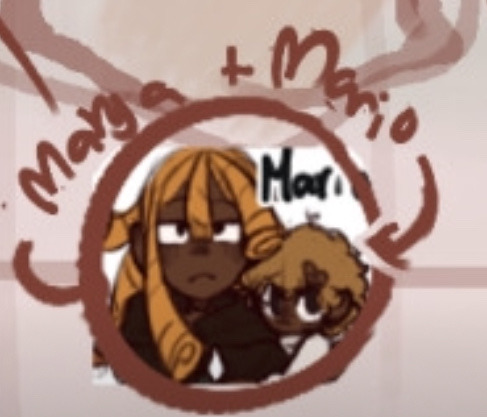
these guys seem interesting!!
*rubs hands mischievously*
so!!!! first one is Dystan :) used he/him prounums, is aroace and has 29 years
He is a elthingt, thats a specie that has the main traits the branch-like horns and tail, they also have it on the shoulders and tip of the ears. they are rather rare, and i can make another post just talking about this specie if u want to


heres his age reference i ddi some time ago
so:
1-3 years: Born on the 3º island, in a small village

5 years: The war bettween Hokht and Anghuliums gets worse, desvasting his village since it was in the middle, loses his family and home. he manages to escape
7 years- after two years of just running away and trying to find a place to live, usually staying in orphanages, a couple of lochtys adopts him, so he moves to the west of the insland to live with them

super lazy illustration of it
at 17 years he signs to the army, still on the war bettwen Hokht and Anghuliums, inicially in the rescue part, wanting to help with the ones who might be suffering what he did but 3 years later he gets transfered to the fighting part due to lack of soldiers.
23: is at the wrong place at the wrong time, by that it means he stepped on a mine bomb. fortunatly elthingt's instincts are pretty fast and the bomb wasnt really strong, so he ddint die but part of his face was disformed, losing a bit of the lip and cheek, and getting blind from the right eye.
24: leaves the army and starts looking for another job, travelling around the islands
25: finds a job as bodyguard for the Lenon family, a family of wealthy demons inn the 1st insland, in the kingdom of Bleshram

heres the family
and thats it, hes been working with them till now :3
extra info:
when he was in the army there was a man that was REALLY in love with him, like constantly flirting (horrible flirt btw), sending gifts, doing declarations to the point that Dystan almost got happy when he died on a battle
nowwith the bodyguard job, he really enjoyys conversations with Firith, the second son, even if most conversations are him just listening (he isnt a big speaker)

listening to him complaining about being rich^
he really likes horses and to cook, specially spicy food
he always sends letters to his mothers, and goes visit them often
bonus of da boy smilling

old drawing lol
OK NEXT ONE
not so long cuz i dont like them as much as i like Dystan lmao
ok so, Marya and Mario

Marya is 18, a human, she/her and bi?didnt decided yet
Mario is 7, hes a boy
i changed their desings slightly since then but not that much
they were born in Bleshram. their father dissapeared a bit before Mario was born and that lead to a deep depression on their mother, who then died of a sickness from being vulnerable.
also, Bleshram is a mainly-demon populated kingdom, so its a bit harder to steal to live being a human cuz humans r dumber and slower but she does what she needs
uhh then a rich demon kinda kidnaps them to force MArya to work for him, but he actually makes their life way better

the red haired one (Netami)
tysm for asking!!!!!!!!!!!!!!!!!!
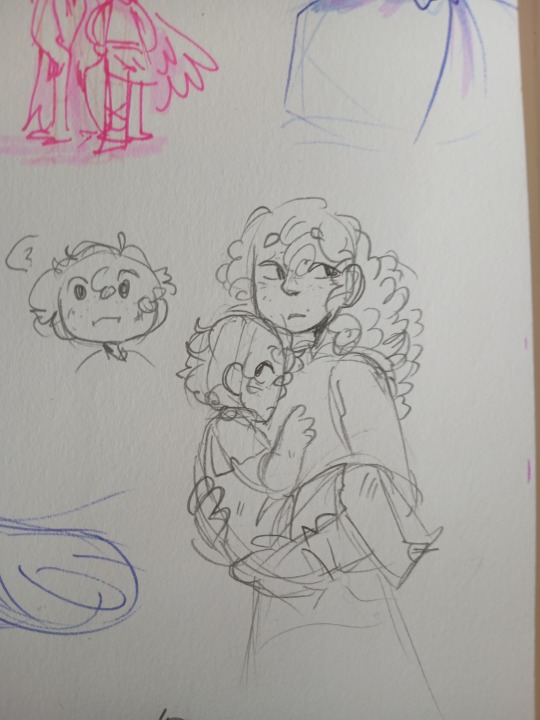
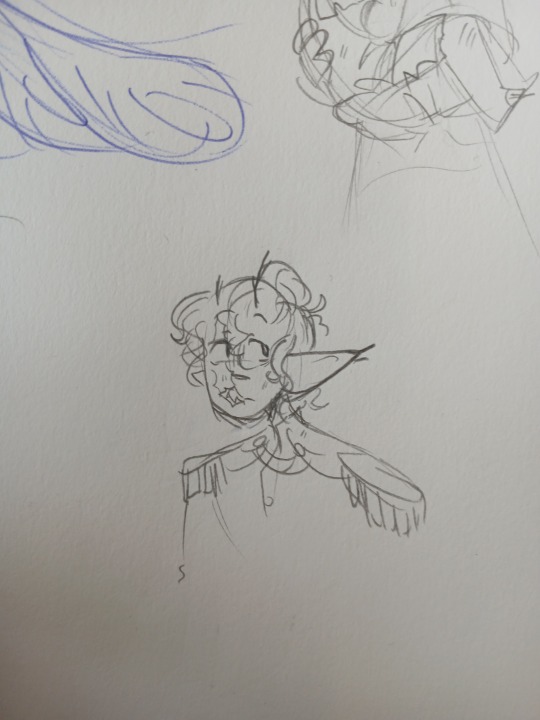
Here's doodles of them as a bonus
110 notes
·
View notes
Text
So apparently there's an official Gallifreyan translator now.
On the one hand, I'm really excited that Sherman's Circular is becoming more and more canon. On the other hand, it feels weird that such major part of the fandom is now being kinda... corporatized. But this blog isn't for my opinions and I don't want to influence yours. All I will say with conviction is that I really hope they credit the original creator.
However, for those who want some more info, I did a comparison between the new "official" translator, the old translator that most people just getting into Gallifreyan probably used, and my own style.

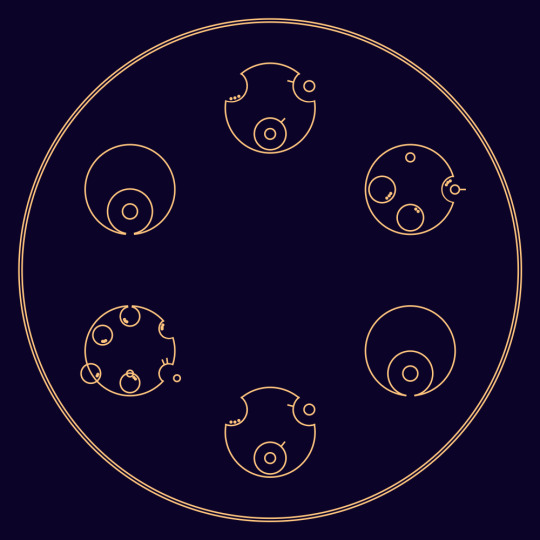

The first image in black is the old translator, the second in yellow on blue is the new one, and the third in blue is my style from two years ago, and all of them say "Never Give Up, Never Give In". (Though only mine includes punctuation). The first and biggest difference between the computer-translated ones and mine is that mine has the various words interlocked. This is something that anyone can do when they write the Gallifreyan on their own, little practice required, but it cannot be done by the computer translators. They only ever put the words in fixed, equidistant positions. Another major difference is the curve of the connecting lines -- this is another thing that neither translator will do for you. The old translator does allow you to curve the lines yourself, but is very finicky about it. The dots are worth noting as well -- in both translators, they are quite small, while I make them big and pretty separated, for ease of reading. In other words, in terms of style and readability, these computer translators will never replace those created manually.
However, there are clear benefits to the translators. They are extremely helpful for those who are just getting into Gallifreyan and want to double-check their work. So long as you remember that what really matters for readability -- the shapes and positions of the circles and the number of lines and dots -- the rest is just stylistic flourishes. And both allow you to download the Gallifreyan as a .svg so that you can edit it in Inkscape or Illustrator or whatever vector editing software you prefer. As for the comparison between the two translators, the new one has more color customization, and will probably better match how Gallifreyan appears on-screen (though I find it interesting that the Gallifreyan on the new Sonic has the starting point of each word be at the furthest point from the center of the circle, while this translator has them at the usual bottom), but the old one allows for more in-engine editing, and as the lines actually connect to somewhere and the dots are slightly larger, it is easier to read.
TL,DR: Manually-made Gallifreyan still allows for far more stylization and is generally the most easily readable, but both translating websites can be useful, especially as both can be downloaded as editable .svg files. The old one is more readable and has in-engine editing capabilities, but the new one allows for color customization and may be more accurate to what is seen on-screen. And Sherman needs to be credited for its creation.
73 notes
·
View notes